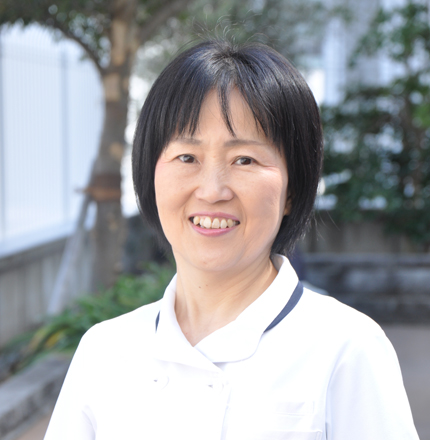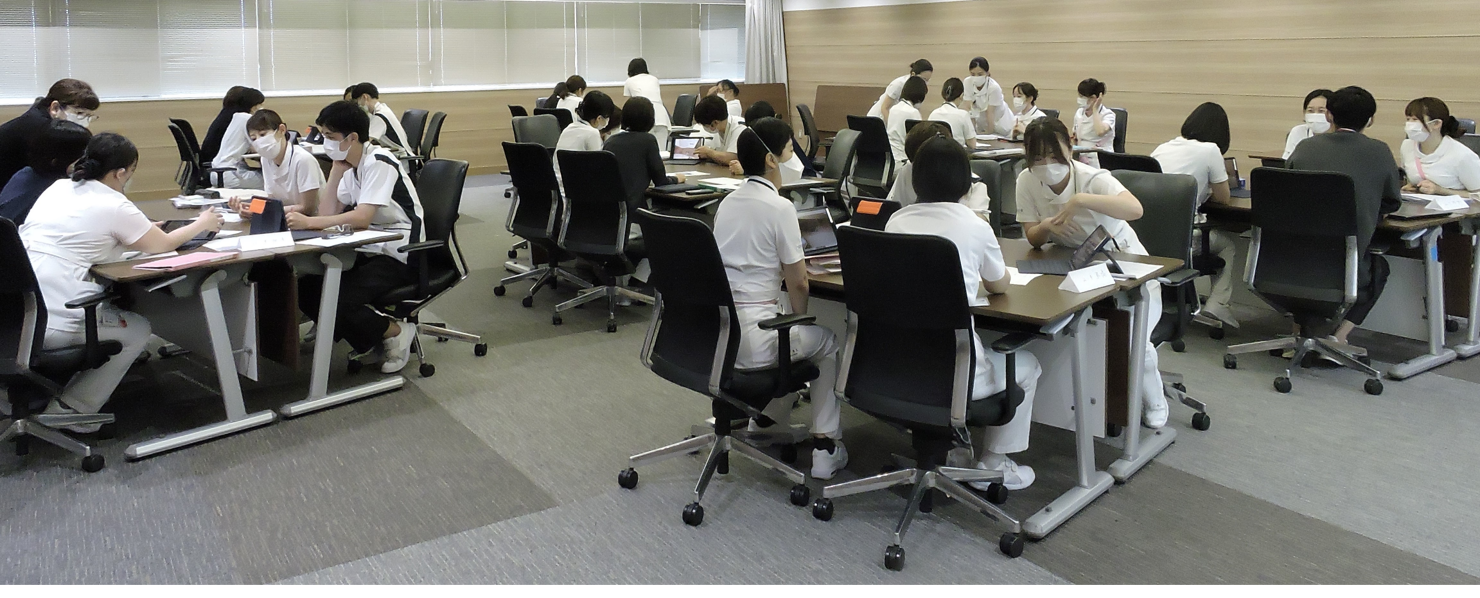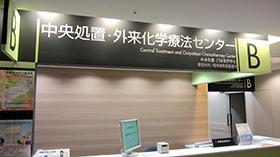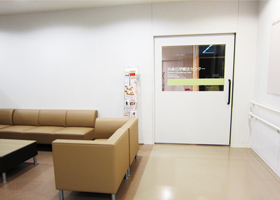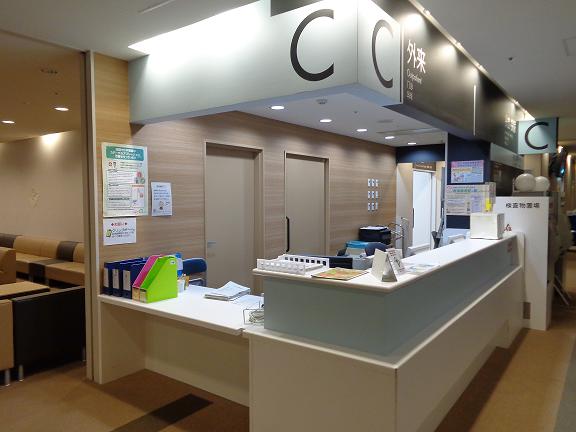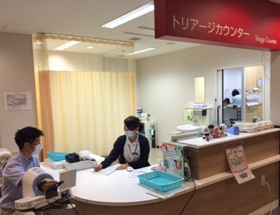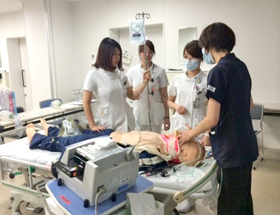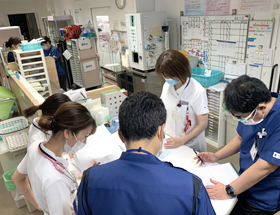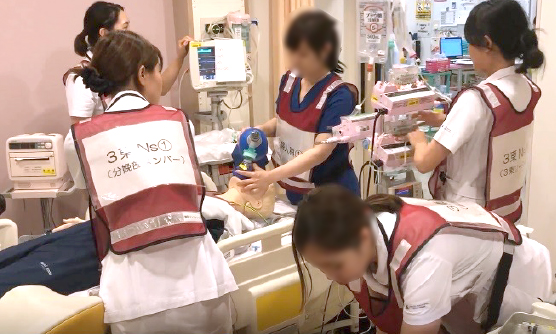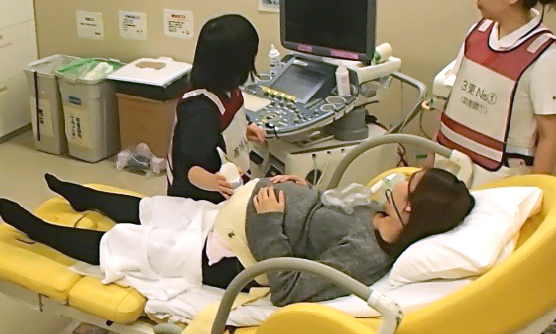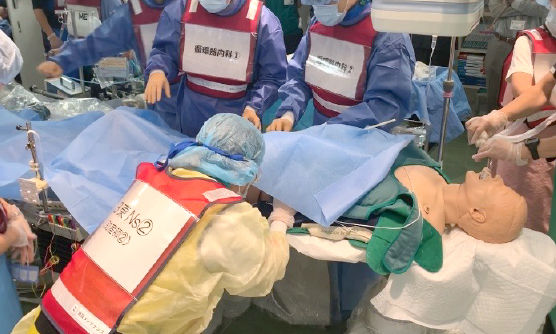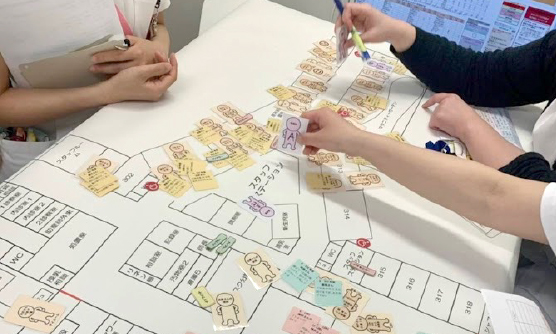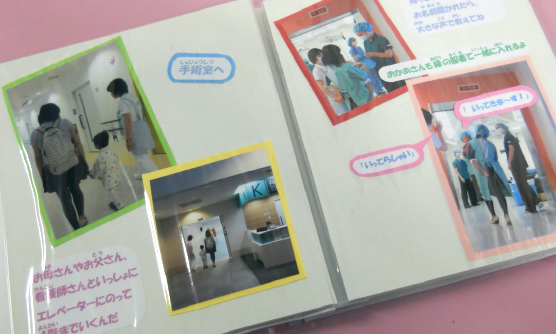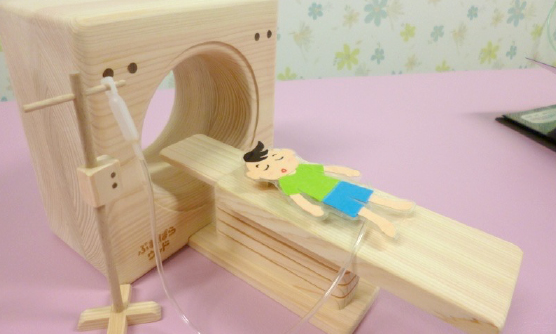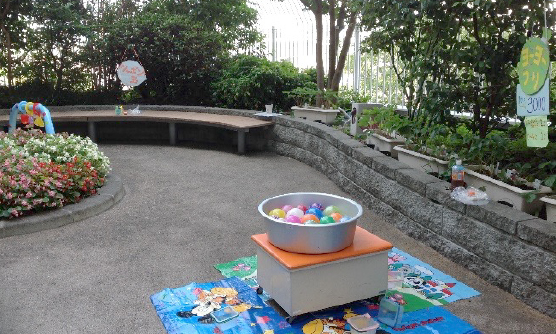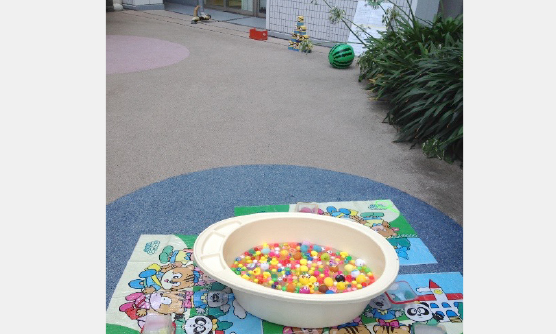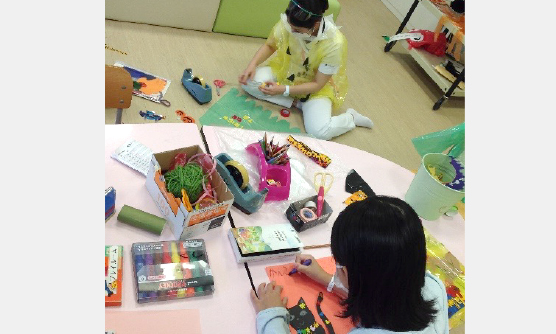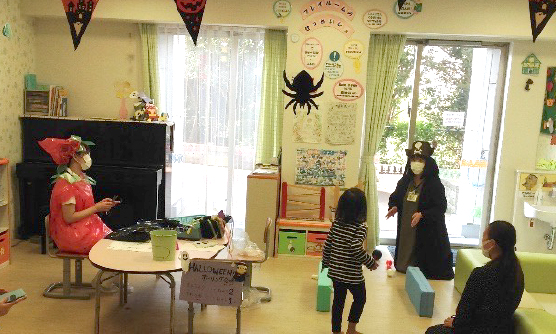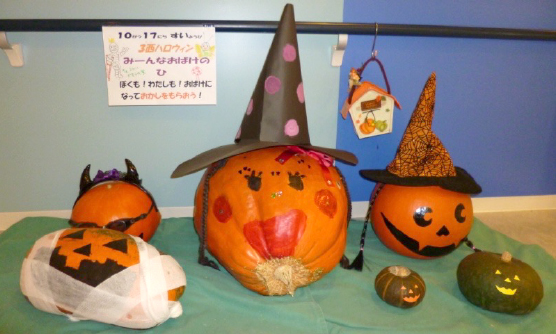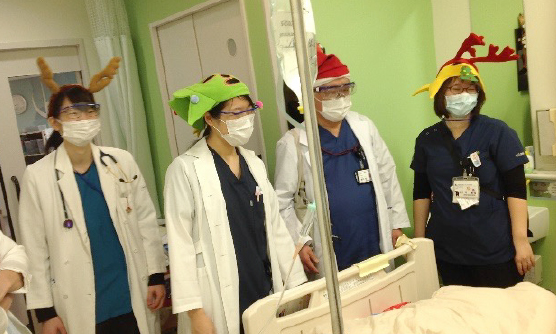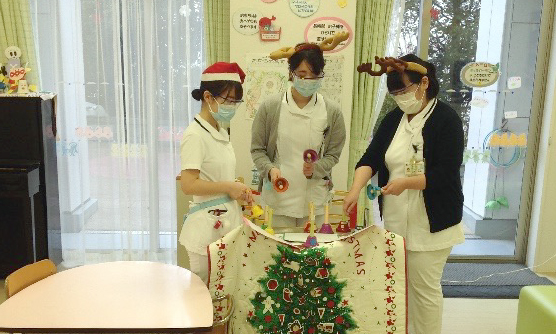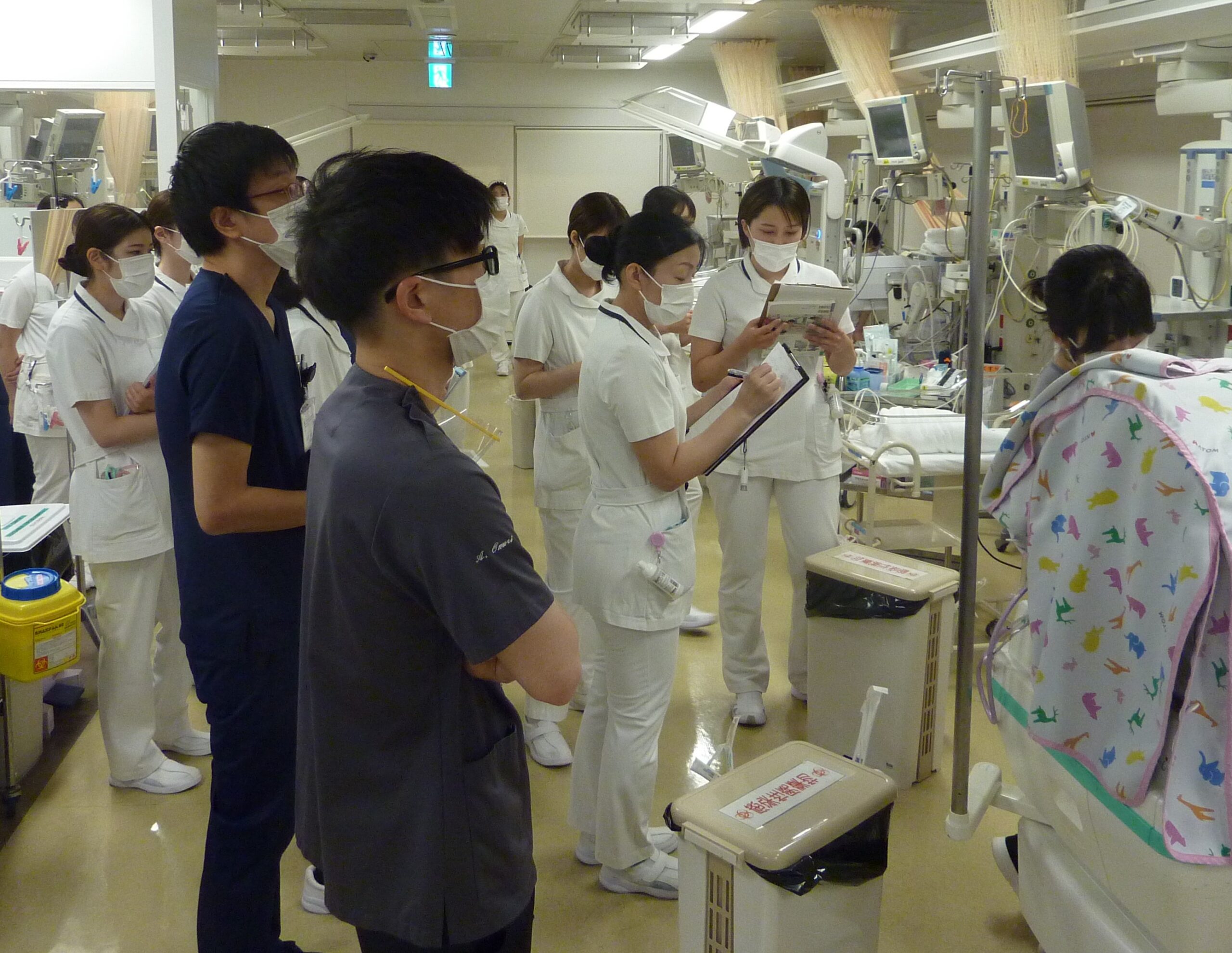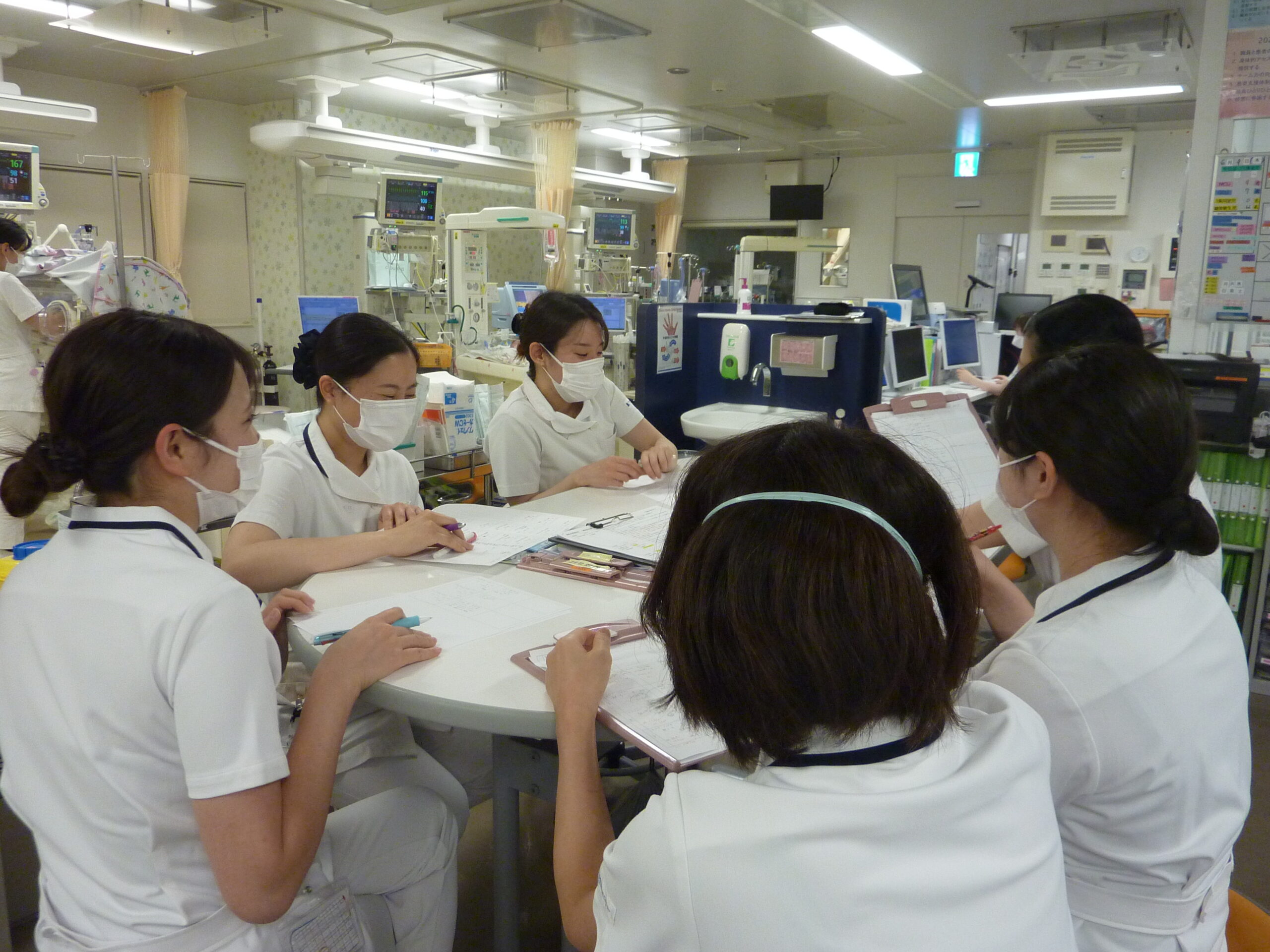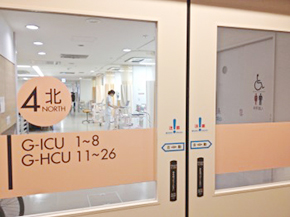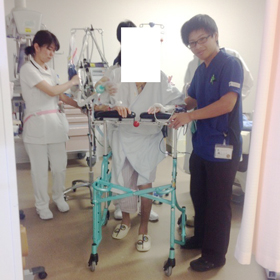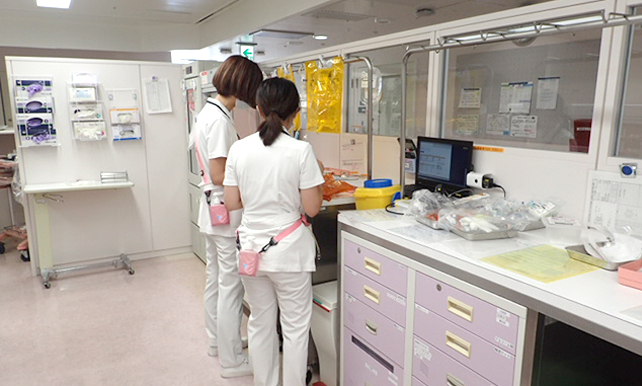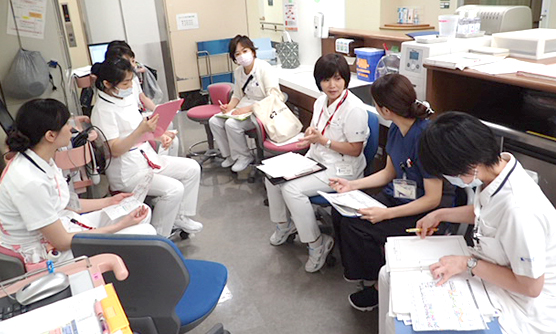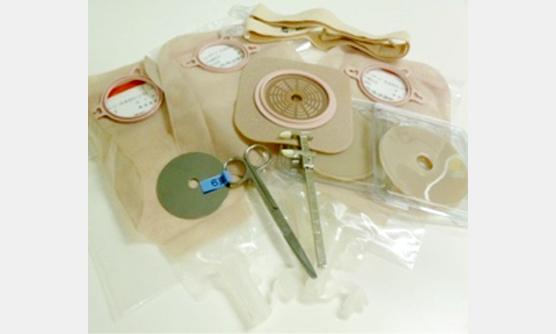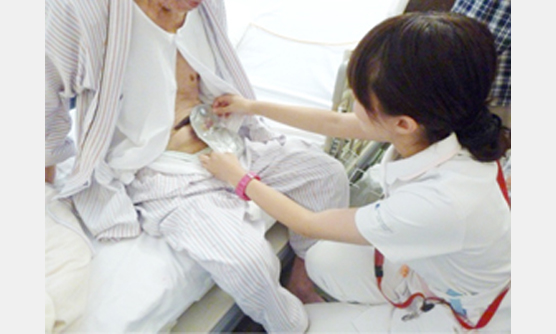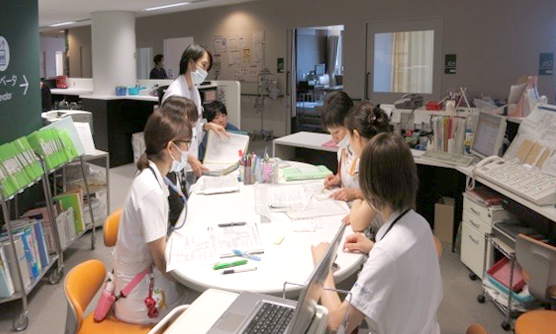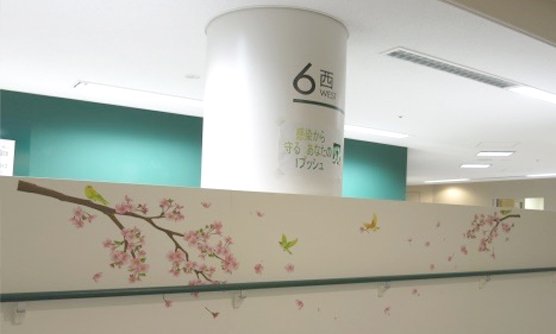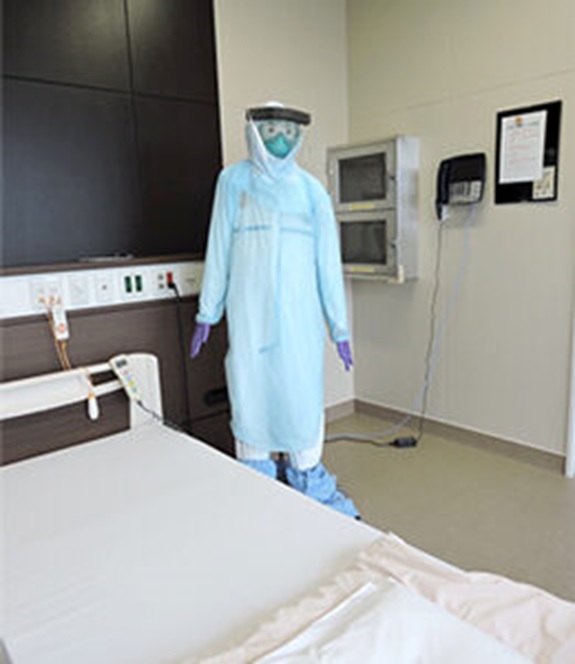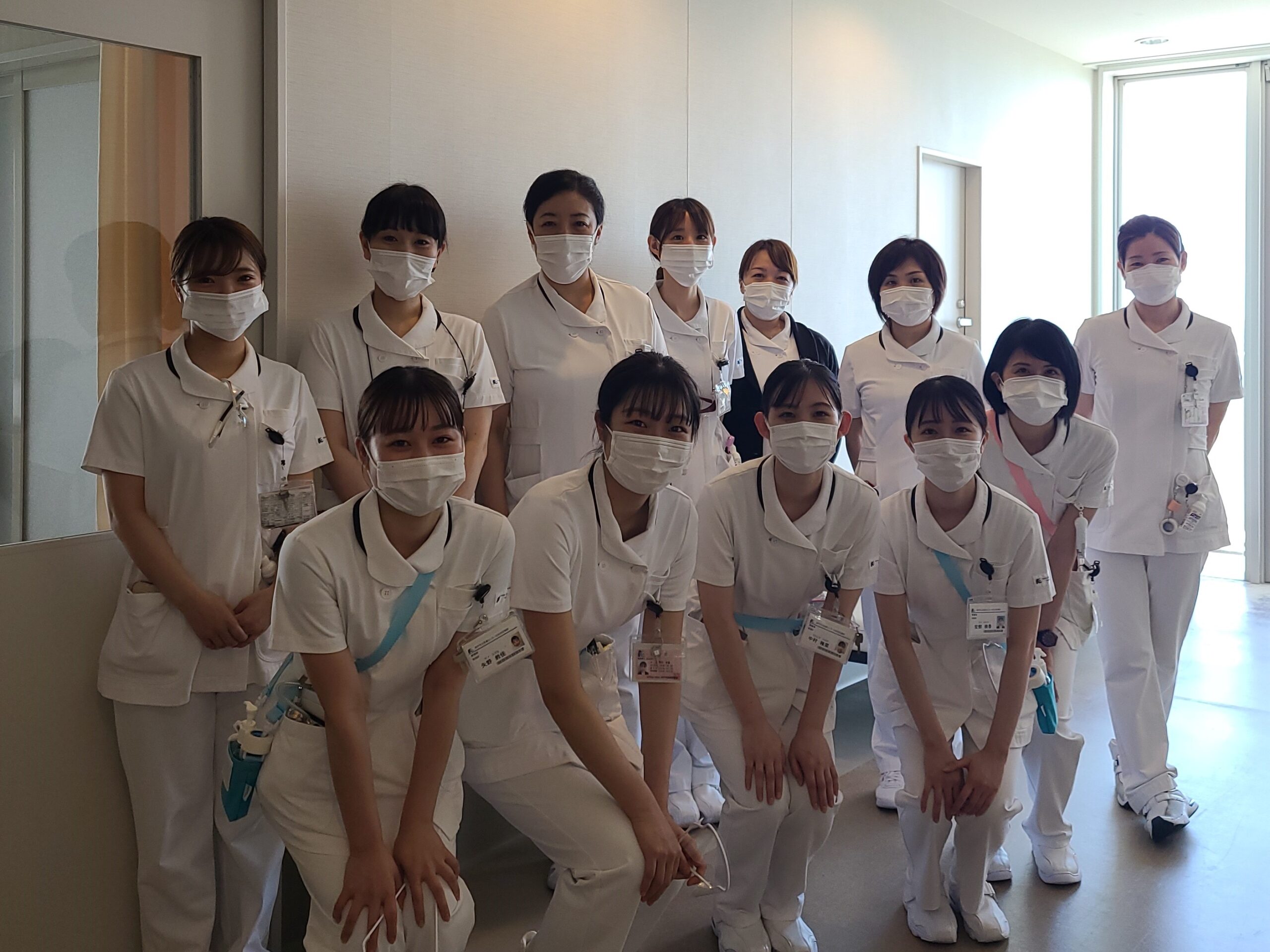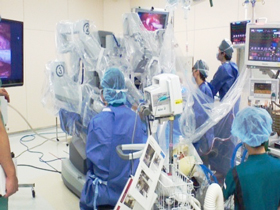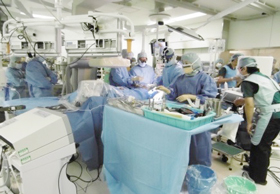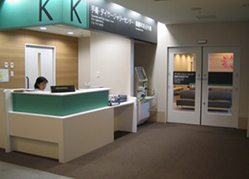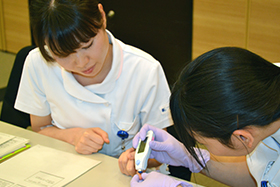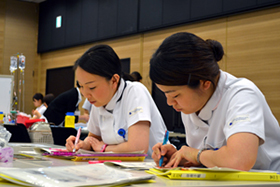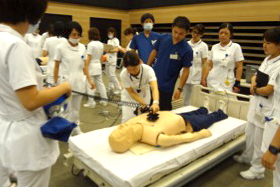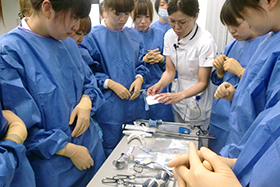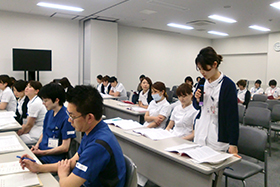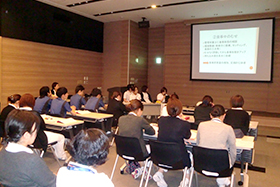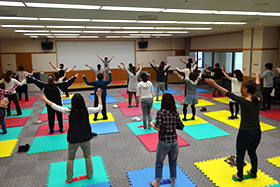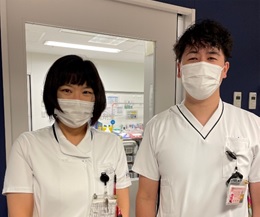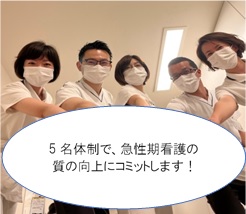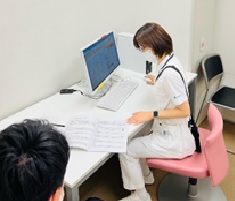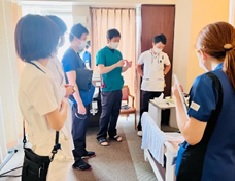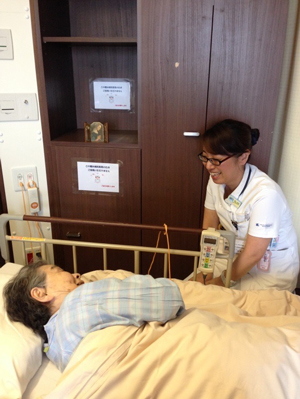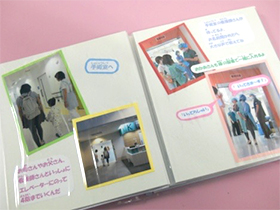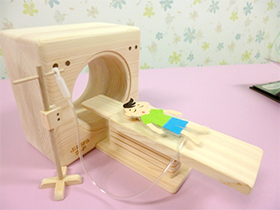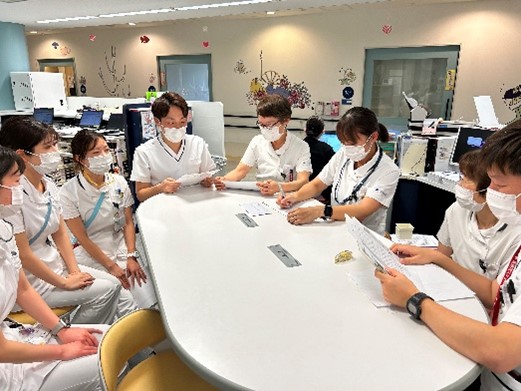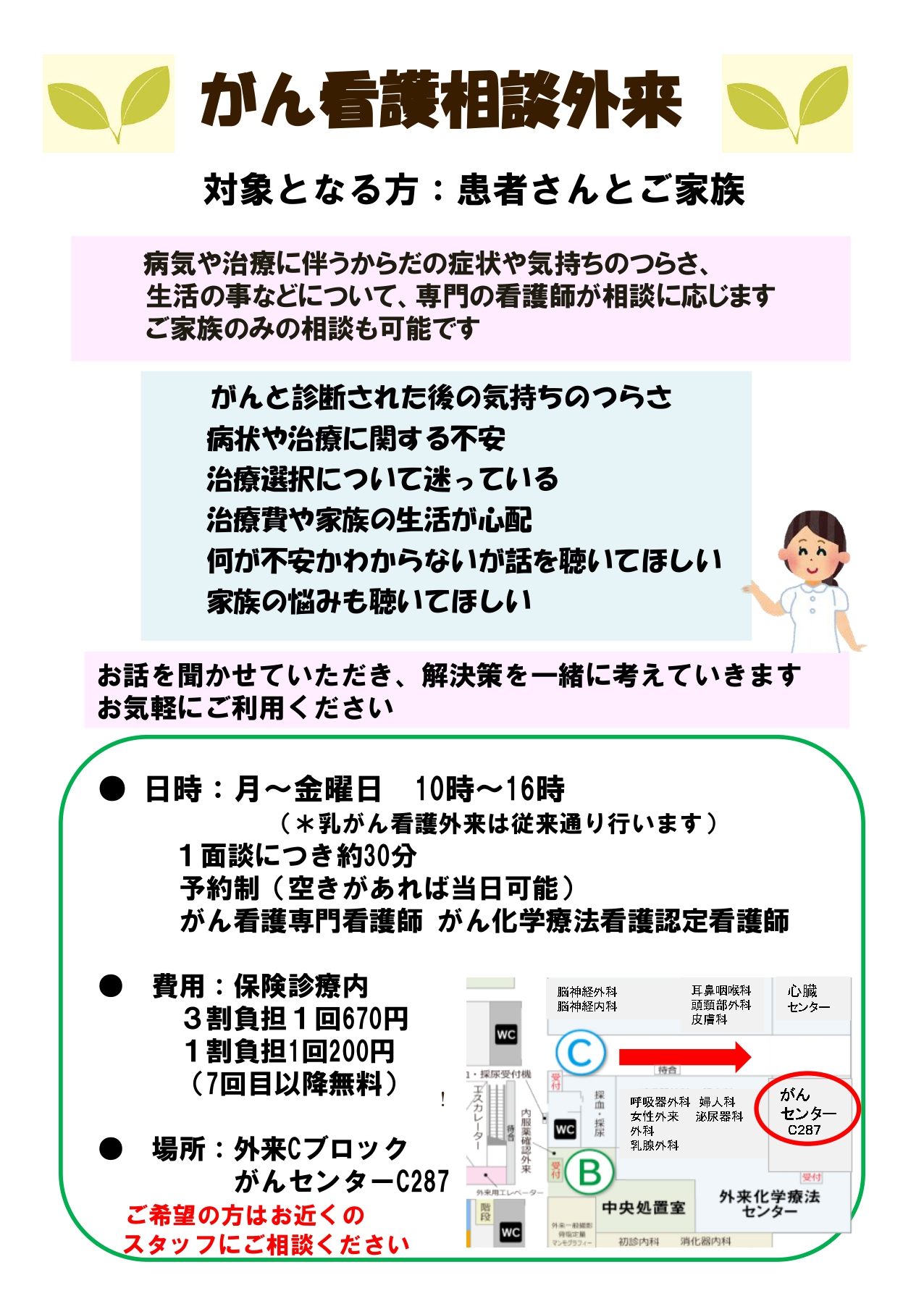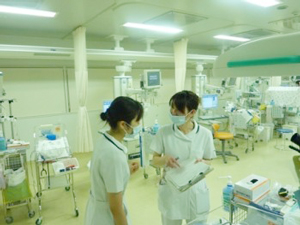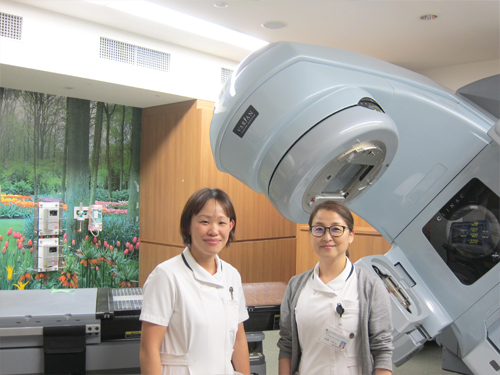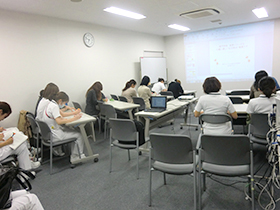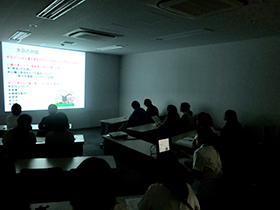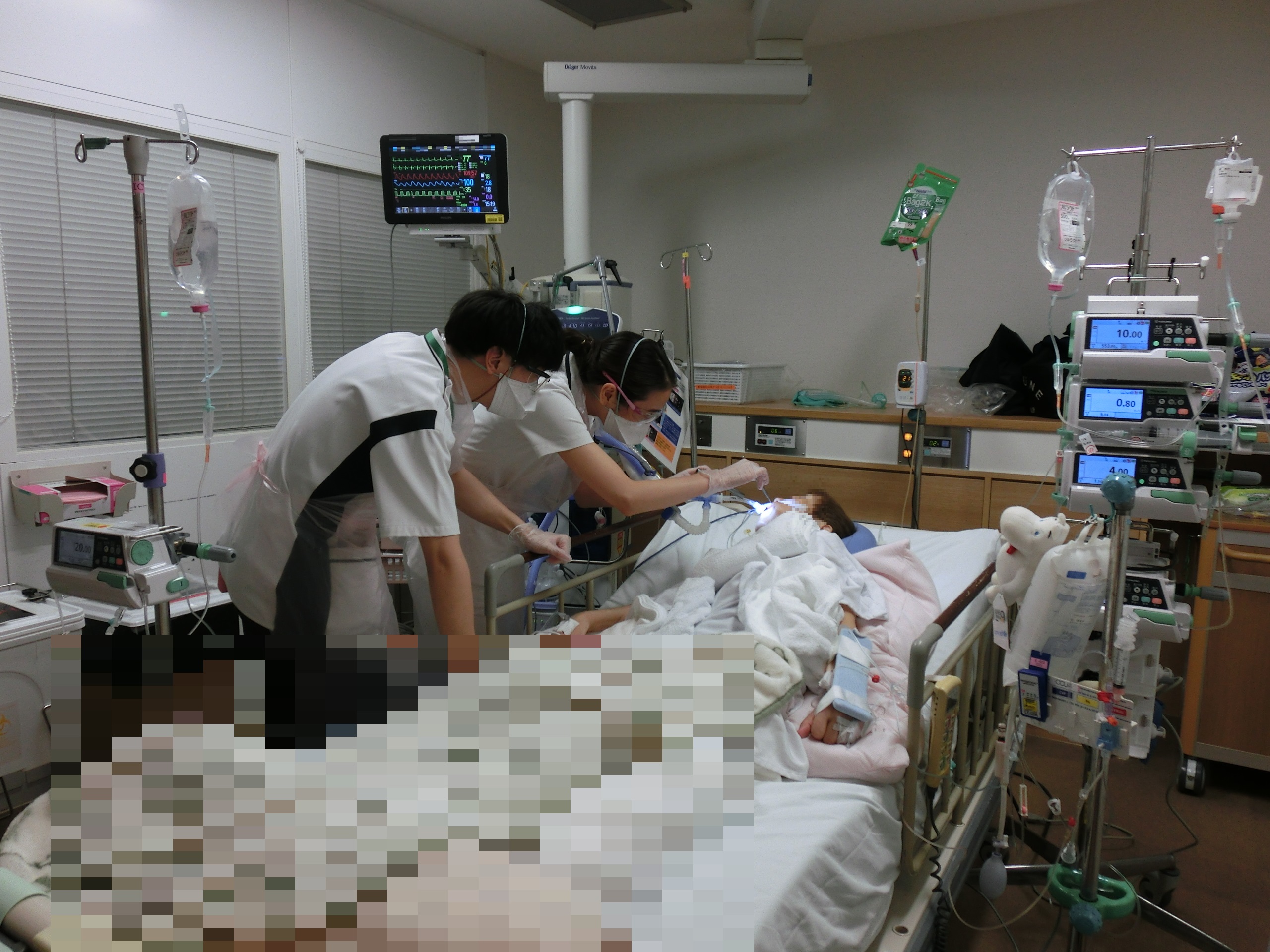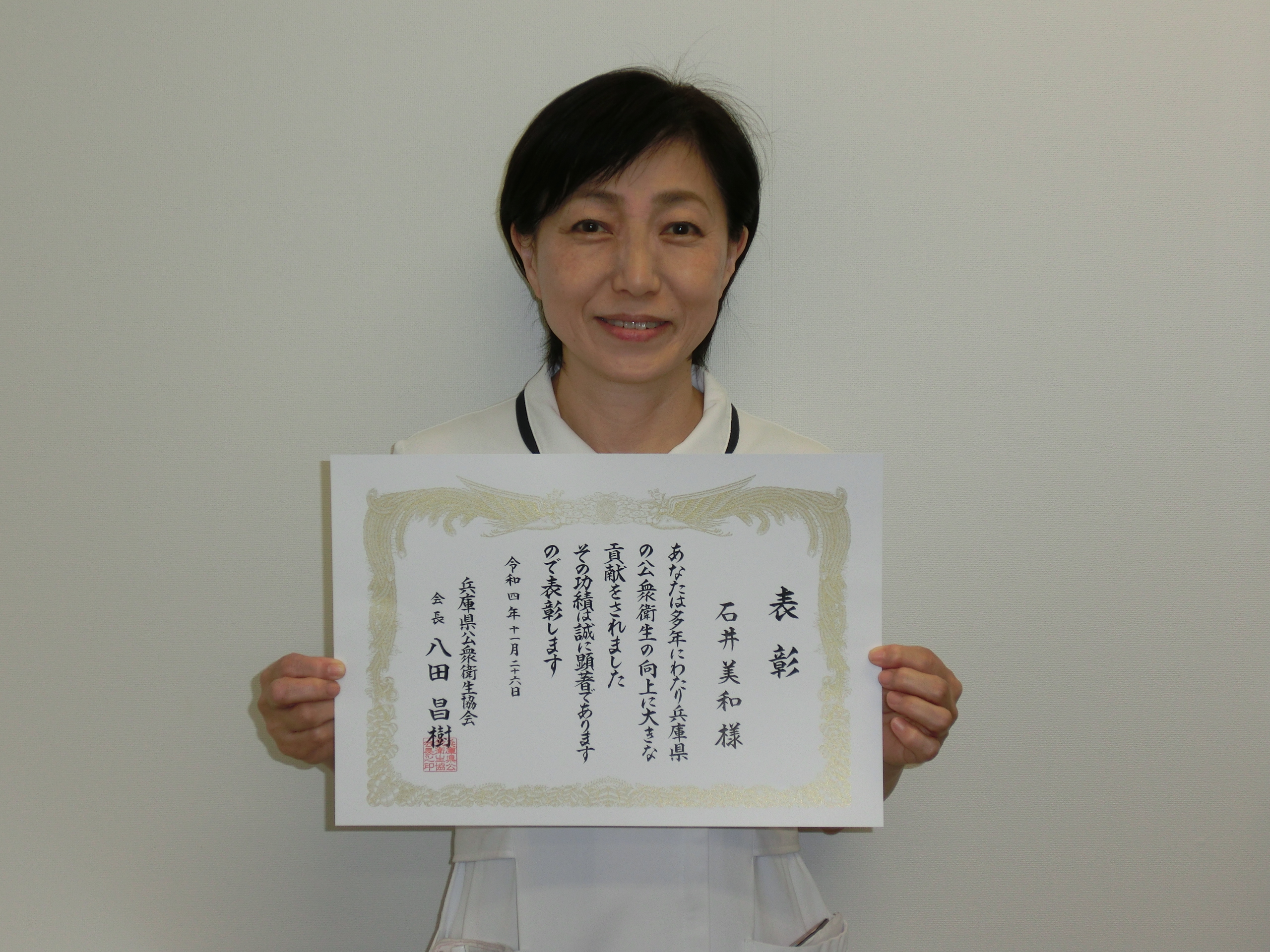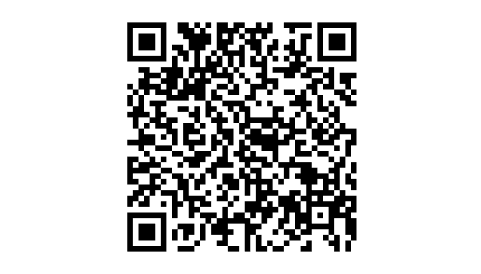The hospital will celebrate its 100th anniversary on March 1, 2024.
During this time, as the flagship hospital of Kobe City, based on the basic philosophy of "safely providing patient-centered, high-quality medical care in order to protect the lives and health of citizens," we are working to practice "emergency care without refusal" and "advanced advanced medical care."
Nursing Department of Kobe City Medical Center values "patient-centered care" and "practice based on scientific evidence". In the past few years, the nursing staff have worked together to accept patients with severe new coronavirus infections. I am proud that all of our staff members have been flexible and able to provide the patient-centered care and evidence-based practices that we have always valued, to each and every patient. In addition, this situation, which could be described as a disaster, served as an opportunity to reaffirm the importance of multidisciplinary collaboration and joint conferences.
While collaborating with various professions, I would like to firmly consider the role of the nursing profession and support each patient.
From now on, we will continue to improve ourselves every day as professionals, and we would like to provide nursing care that always earns the trust of our patients.
〈Philosophy of the Nursing Department〉
Provide patient-centered, high-quality nursing care with rich sensibilities and highly specialized knowledge and skills.
〈Nursing Department Policy〉
- Provide quality-of-life care with a holistic view of the patient
- Practice evidence-based practice
- Promote team medical care and practice the role that nursing should play
- Contributing to continuous medical services with local medical, health, and welfare
- Self-improvement and aiming to be an autonomous professional
- Create an environment where employees can work with enthusiasm, caring for each other
Vice President / Director of Nursing Noriko Fujiwara
About Nursing Department
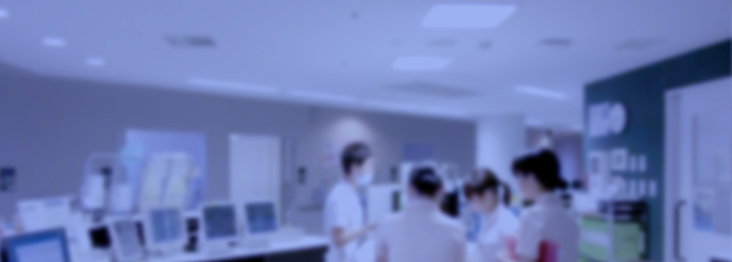
Ward department
The ward department has 19 wards on the 3rd to 9th floors, and accepts the department in charge and emergency patients from all departments.
central administration
The Central Department has an operation department and an intensive care department on the 4th floor. The surgery department is available 24 hours a day for emergency surgeries.
outpatient department
There are 3 blocks, A, B, and C, on the 2nd floor, and 37 clinical departments, including referrals, are available by appointment in principle. Physiological examination rooms, blood sampling and general radiography rooms are also set up around the outpatient clinic. It also has an Outpatient Chemotherapy Center and a prehospital preparation center.
Emergency and Radiology Department
The emergency department has an outpatient clinic and a ward on the 1st floor, and the radiology department has examination and treatment rooms on the 1st and 2nd floors. Emergency and radiology departments work together to provide emergency care.
Regional medical department
There is a Regional Medical Cooperation Center on the second floor, and we are working on regional cooperation. Collaborates with MSW and clerical staff and mainly assumes the role of coordinating discharge.
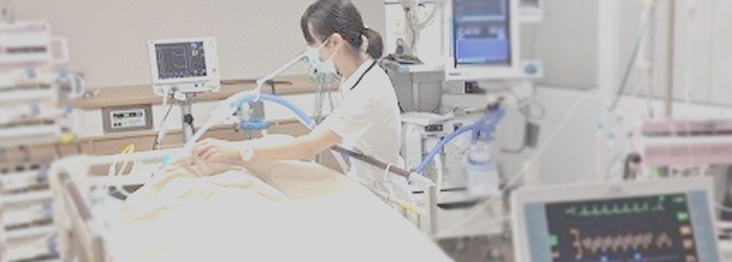
General Affairs Committee
Nurses, who work closest to patients, are required to be well-groomed in terms of infection control and customer service manners. We are always aware of being watched and support you to become a good nurse.
main activity
- Appearance self-check/other self-check
- Promoting participation in customer service etiquette training, transmission training in own department
- Organize staff common spaces and common equipment
Board of education
We provide nursing staff with a variety of learning opportunities both inside and outside the hospital. In addition to basic training from new recruits to the third year after graduation, we also provide highly specialized nurses such as certified nurses and specialized nurses so that each staff member can study according to their career design. We are conducting specialized training by planning. In addition, we provide opportunities to support career development and ability improvement such as advancing to universities and graduate schools, as well as opportunities to participate in external training.
Safety Committee/ Safety Management Nurse Association
Nursing Department Safety Committee works in cooperation with the Safety Management Nurse Association. Members of the nurse association are selected from each department and work on safety promotion activities in their departments. In 2023, we will work on Team STEPPS, which started last year, to evaluate and revise the internal medicine management manual and improve team strength. In addition, in order to improve nursing practice skills and improve care, we will continue to work on improving oral care records.
Infection control committee
Nursing Department Infection Control Committee works with the link nurses in all departments to implement and promote infection control measures within the hospital.
- Improving the knowledge and skills of infection prevention throughout the hospital through link nurses
- Examination of nursing procedures to prevent infection
- Evaluate and improve the safe environment in the hospital
- Implementation and evaluation of measures to prevent needle sticks, cuts, etc.
- Surveillance Implementation, Evaluation and Feedback
Committee members selected from each department work on a daily basis to increase the compliance rate of hand hygiene and alcohol consumption to protect patients from infection in each department.
Nursing Information and Investigation Committee
I present data and make proposals so that you can understand the current situation of each department related to nursing. In addition, along with the introduction of IT in the hospital, we are considering and promoting improvements related to the work of nurses. We also manage electronic devices related to nursing information.
main activity
- Quantitative and qualitative audits of nursing needs, preparation of data submission, proposals related to medical fees
- Development of information transmission system, study of efficient recording method of nursing information
- Management of electronic devices such as electronic medical records
Nursing Quality Improvement Committee
We are working on the preparation and creation of manuals for safely practicing nursing.
main activity
- Creating Nursing Standards
- Updating nursing skills and nursing procedures
- Operation of the Nursing Department Records Committee
It has many intensive care units and high care units to provide advanced acute care. Nurses are assigned 7:1 for general wards, 2:1 for severe departments, and 4:1 for high care units. In addition, as a comprehensive perinatal maternal and child medical center, it also has an MFICU (maternal-fetal intensive care unit) and is linked to the NICU (neonatal intensive care unit). In addition, as an emergency medical center, we have a system that can handle emergency examinations and treatments 24 hours a day, 365 days a year, as well as emergency surgery in the imaging medicine and radiology departments and the operating room so that you can receive treatment with peace of mind.
Workplace introduction
outpatient department
A block
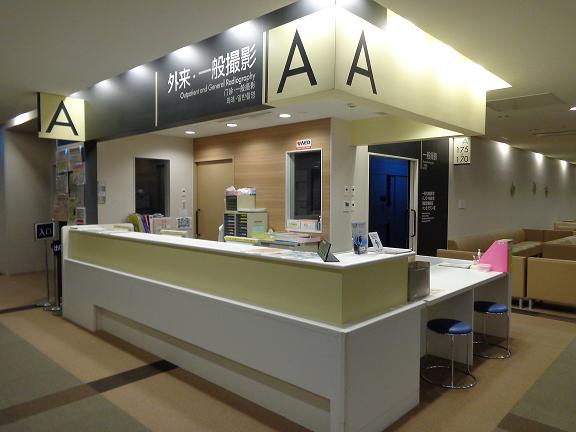
Orthopedic Surgery
Our Orthopedic Surgery department performs knee and hip joint surgery, finger reattachment, spine surgery, fracture surgery, and more. In addition, there are many patients who are transported by ambulance due to traffic accidents or work-related accidents, and we provide appropriate treatment and surgery to help them return to society as soon as possible. Recently, it has become possible to treat osteoporosis by injecting at home. In addition to drug therapy, nurses also provide guidance on exercise therapy and diet therapy so that such patients can be treated with peace of mind.
Plastic Surgery
We perform treatment and surgery for patients with burns, fractures of facial bones such as nasal bones, and aftereffects of injuries. Many burn patients are children, and I try to reduce their anxiety when changing gauze.
Neuropsychiatry
The Department of Neuropsychiatry has an outpatient clinic for dementia. Reflecting the super-aging society, the number of patients is increasing. doctor carefully explain the diagnosis results from psychological tests and imaging tests for early detection of dementia, and nurses support life at home by providing lifestyle guidance and guidance on social resources.
Oral surgery
Oral and Maxillofacial Surgery performs oral surgery such as wisdom tooth extraction and surgery to improve the bite. Dental hygienists work with nurses to manage the oral hygiene of patients undergoing surgery and other treatments at our hospital. Through oral care, we support patients with the aim of preventing aspiration pneumonia and reducing oral problems caused by cancer treatment.
Central treatment room
In addition to blood transfusions and various infusions and injections, we also perform procedures such as pleural and ascites puncture, gastric fistula (PEG) replacement, autologous blood collection, bone marrow aspiration, and thyroid biopsy. Necessary examinations and treatments for patients may be accompanied by pain and side effects. Our nurses carefully observe and consider so that you can receive safely and with peace of mind.
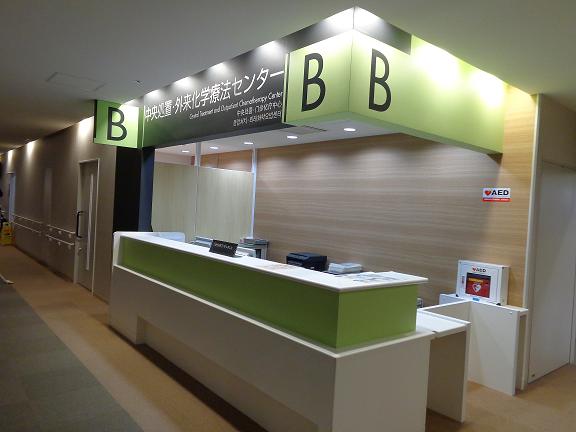
In addition, patients and their families often share questions and concerns during procedures and injections that they could not ask the doctor in the examination room. In such cases, we listen to the patient's thoughts and cooperate with the nurses of each clinical department to support patients and their families to their satisfaction.
We provide nursing care so that patients can receive treatment and treatment in an outpatient setting with peace of mind, and when they leave the room, they can go home with a sense of relief.
Outpatient Chemotherapy Center provides support so that patients can receive outpatient treatment with peace of mind.
For patients undergoing treatment for the first time, pharmacists and nurses work together to talk about the flow of treatment, precautions in daily life, side effects, and how to deal with them. After that, we are able to reduce concerns and anxieties during repeated treatments, and provide various support so that patients can live their lives as they please. One of these is telephone counseling on side effects for outpatients.
In addition, we are distributing videos for patients and their families who remove needles from continuous infusion pumps for home use at home. We have received positive feedback from patients that they can see the procedure at home any number of times, and that they can safely remove the needle at home. Please use it if you can receive the target treatment.
Click here for the video "How to self-remove the Trefuser pump at home"
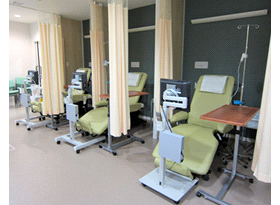
At the Outpatient Chemotherapy Center, we strive to ensure that Oncology can live the same life as before treatment as much as possible, and that they feel that they will be able to continue treatment. We would like to continue to provide nursing care while coordinating with the clinical department, pharmacy department, and other departments within the hospital, and to continue to support patients and their families.
Cancer center outpatient
The Cancer Center is an "organ-specific unit" introduced in April 2013 to handle highly specialized cancer treatments. Gastroenterology It consists of the Department of Surgery, Respiratory Medicine, Respiratory Sugery, Hematology, Breast Surgery, Oncology, Palliative Care, and Radiation Oncology, which collaborate with each other as appropriate.
The goal of the cancer center is to provide advanced cancer treatment that can be completed in the community through collaboration and collaboration with local medical care. When deciding on a treatment policy, the entire medical team considers the patient's background and considers the best for each individual patient, helping the patient to make a satisfactory choice. In addition, we provide support while collaborating with local medical care as necessary so that people can continue to live their own lives with peace of mind even if they develop cancer.
Gynecology
The gynecological outpatient department on the 2nd floor examines patients with benign and malignant gynecological diseases, ectopic pregnancy, fetal death, and other diseases. In the treatment of malignant tumors, there are options such as surgery/radiation therapy and cancer drug therapy. We provide support in cooperation with inpatient wards and various treatment departments so that individual patients can select the treatment that is best for them and complete treatment. For uterine fibroids, among the benign diseases, we provide hormone therapy before surgery, provide information before and after surgery such as fertility preservation, and consult on physical condition management.
Medical assistance is provided by a female nurse, and we strive to make you feel as relaxed as possible during tense examinations and examinations such as pelvic examinations.
Urology
Major diseases treated by Urology include prostatic hyperplasia, prostate cancer, bladder cancer, and kidney cancer.Surgery, anticancer drug therapy, radiotherapy, I am on hormone therapy. Since there are relatively many elderly people in the Urology, I try to take time to ask them about their symptoms and current problems.
The treatment of prostate cancer includes robotic surgery, IMRT (radiation therapy), brachytherapy (internal radiation therapy), and hormone therapy. We provide information and various explanations so that patients can choose treatment considering the disease stage and QOL. After the acute phase treatment at our hospital is over, we also support long-term follow-up and treatment in cooperation with hospitals and clinics near your home.
For patients with dysuria, a symptom peculiar to the urinary system, we provide outpatient guidance on intermittent self-catheterization and exchange of external fistula catheters. While listening to the situation at home, I try to provide sufficient explanations and support so that urinary care can be performed smoothly by the patient and his/her family, and so that the patient can live at home with peace of mind.
Cardiac Center (Cardiology /Cardiac Surgery)
The Cardiac Center provides continuous support to patients undergoing cardiac rehabilitation for angina pectoris, myocardial infarction, heart surgery, heart failure, etc., with the goal of enabling them to self-manage their illness. After the outpatient examination, we will ask you about your physical condition after discharge and the management status at home, etc., and discuss how you can prevent recurrence and re-hospitalization. Disease management can also affect life prognosis. I hope that I can help you live a healthier life.
Neurological Center (Department of Neurology, Neurosurgery)
Neurological Center: Department of Neurosurgery and Neurology. Neurosurgery who visit a neurosurgeon for the purpose of surgery for diseases such as cerebral aneurysms, brain tumors, and cerebral artery malformations come to the clinic with a great deal of anxiety about "surgery on the head." We provide patient information to the pre-hospital preparation center so that patients can undergo surgery with peace of mind. In the Department of Neurology, we aim to help patients with intractable neurological diseases such as amyotrophic sclerosis (ALS), whose symptoms gradually progress, and their families to live as they are, by doctor and regional medical centers. In addition to discharge coordinating nurses, we collaborate with visiting nurses in the community to provide lifestyle guidance and consultations for recuperation.
We continue to support outpatients and their families so that they can live safely and comfortably at home.
Sensory Organ Center (Otorhinolaryngology, Head and Neck Surgery, Ophthalmology)
Otorhinolaryngology /Head and Neck Surgery has many diseases that directly lead to breathing, eating, and speech disorders, and life may change significantly after treatment such as surgery or radiation. To ensure that patients can smoothly return to their daily lives after treatment, we call out to them every time they see a doctor, check if they have any problems, and provide support in terms of daily life.
Ophthalmology has a lot of examination equipment and a dark room, so we guide people who have difficulty seeing. In addition, since there are a large number of surgeries, we provide support to ensure a smooth transition from outpatient to hospitalization, surgery, and postoperative outpatient visits.
Dermatology
We examine skin diseases such as hives, bedsores, athlete's foot, and side effects of chemotherapy. We perform surgical treatment of wounds (for example, treatment of ingrown toenails, treatment of fingers likely to cause necrosis, etc.) and treatment using ointments. Recently, the number of patients with allergic diseases and lifestyle-related diseases has increased, and we are conducting allergy challenge tests. Our nurses are dedicated to giving you detailed instructions so that you can take care of yourself at home.
Ward department
emergency room
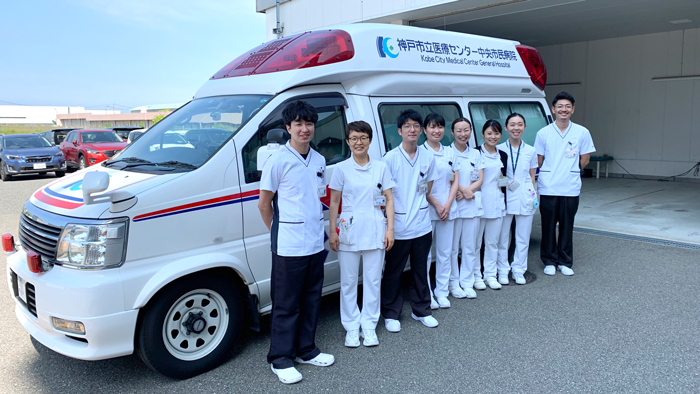
For the training of nurses (triage nurses) who judge the urgency of all patients who visit the emergency department and determine the priority of medical care, and the training of Dr. Car nurses who are responsible for pre-hospital relief, disaster support nurses, and DMATs. are also making efforts. Regular joint drills and conferences are held with the Kobe City Fire Department and lifesaving centers of other hospitals in order to collaborate with the local community.
Precisely because the situation is tense, we aim to provide nursing care that is close to the feelings of patients and their families. We are working to improve our knowledge and skills through simulations and case studies so that we can provide safe and secure nursing care to patients.
Emergency Ward/Second Emergency Ward
The emergency ward has a total of 32 beds, and the second emergency ward has a total of 8 beds, and accepts various acute hospitalizations 24 hours a day, 365 days a year, regardless of disease, age, department, or severity of injury. A team of doctor, nurses, pharmacists, and physiotherapists work together to ensure that emergency hospitalized patients and their families can live in hospital with peace of mind. Aiming to "provide safe and high-quality nursing care", we are working to improve knowledge and skills through team activities and study sessions.
MPU Ward
Many patients who visit an emergency center require psychiatric treatment. At the MPU (Psychiatric Somatic Complications Unit), we aim to provide high-quality medical services that value each and every patient by cooperating with doctor in physical departments, psychiatrists, and other occupations. Nurses working at MPU aim to become “nurses who can see the body and mind”, and hold study sessions in cooperation with emergency department staff and liaison nurses, striving to improve the quality of psychiatric and physical nursing. increase.
In addition to helping nurses grow as nurses, we are also focusing on work style reforms that are conscious of work-life balance and creating a comfortable workplace.
There are more than 100 nurses belonging to the emergency department, and various activities are held regularly to promote teamwork. Also, if you have any concerns or worries, there are many seniors who will kindly consult you. Every day is full of changes, but the bond is deep and strong because we are a team that can overcome it.
EICU/CCU is an intensive care unit located in an emergency center. Severely ill patients are transported day and night. There are many seriously ill patients, and all the staff aim to provide advanced and cutting-edge medical care and nursing that lead to recovery. The department targets a wide range of diseases, including multiple trauma, severe respiratory failure, cardiovascular disease, and cranial nerve disease. It also functions as an ECMO center that can treat severe respiratory failure with extracorporeal membrane oxygenation.
What is important in the department is cooperation and cooperation with multiple occupations. In addition to doctor, physical therapists, Registered Dietitian, pharmacists, clinical engineers, and other professionals work together to understand the patient's condition and provide better treatment.
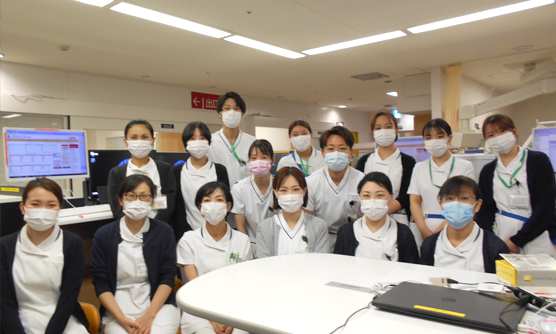
The 3rd floor east ward is the obstetrics and Obstetrics and Gynecology ward
Since April 2013, our hospital has been accredited as a comprehensive perinatal maternal and child medical center. As a core hospital not only in Kobe City but also in Hyogo Prefecture, and as a tertiary emergency hospital, we cooperate with various departments and actively accept pregnant and puerperal women, such as normal pregnancy, complicated pregnancy, threatened premature birth, and postpartum hemorrhage. In addition to the obstetrics and Obstetrics and Gynecology ward, we also have an MFICU (maternal and fetal intensive care unit), and we work together with the NICU (neonatal intensive care unit) to face the lives of mothers and babies every day.
Since we can handle emergency caesarean section, super-emergency caesarean section, and death-defying caesarean section, we regularly hold study sessions and simulations. We also actively participate in workshops such as NCPR, J-CMELS, and ALSO.
Since I am in charge of not only the ward but also the obstetrics outpatient clinic, my strength is that I can be involved in consistent care from pregnancy to postpartum through Midwife Outpatient, pregnancy consultations, breastfeeding consultations, 2-week checkups, and 1-month checkups.
In addition, our hospital recommends breastfeeding, and is an IBCLC (Internationally Certified Lactation Consultant: a healthcare provider with a certain level of skills, knowledge, and attitude necessary to support successful breastfeeding). We are also focusing on breastfeeding, especially for our staff.
The ward also accepts gynecological patients. For gynecological diseases, we hold study sessions sponsored by Obstetrics and Gynecology and gynecologists, and also focus on gynecological nursing.
In addition, we conduct exercises so that all staff can practice general nursing techniques.
We are also actively engaged in disaster prevention activities. To protect the safety of patients in an emergency, we regularly conduct disaster prevention drills, inspect items, and improve the environment throughout the ward.
Staff introduction
Currently, there are more than 40 midwives and several nurses in the East Ward on the 3rd floor. Some nurses aspire to become midwives.
We have a wide range of staff from advanced midwives to young midwives and nurses. There are many staff members who joined the company midway through or who are raising children, and there are various ways of working.
3 West Ward is a pediatric ward for newborns to children under the age of 15 (junior high school students and younger).
We provide nursing care according to the developmental stage for children with acute diseases requiring emergency hospitalization, chronic diseases specific to children, allergic diseases such as pediatric asthma and food allergies, and diseases for the purpose of surgery such as Orthopedic Surgery and otolaryngology. I'm here.
For children to do their best in examinations and treatments
We use media such as pamphlets and models according to the age of the child to explain the examination and treatment, so that the child understands and is involved in the examination and treatment. In addition, with the cooperation of family members, I use play to distract myself and to minimize anxiety and fear as much as possible.
In addition, even if a child needs to be hospitalized due to illness or injury, we have created an environment that promotes growth and development in the same way as before hospitalization. We strive to provide nursing care for children and their families so that family members who are close to children can feel at ease when caring for them.
To stay like a child while in the hospital
The pediatric ward has one ward nursery teacher, who is responsible for children's play such as radio calisthenics and outdoor play in the kids' garden and crafts in the playroom. In addition, for children who are unable to leave their wards due to infectious diseases, etc., we visit them and provide them with play.
Volunteers hold storytelling sessions and ventriloquism in the playroom, as well as plan and hold seasonal events throughout the year.
Summer festival
Halloween
Christmas party
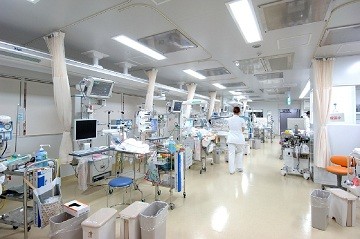
Immediately after the baby is born, treatment and care are given to stabilize the condition. After the baby has stabilized, we are involved in deepening the bond between the father/mother and the baby, helping them to leave the hospital with peace of mind. Babies can't speak, but they complain with a variety of signs. We value listening to the "voice" of such babies.
There are many young staff as well as experienced staff, and even in a homely atmosphere, they work with aspirations and improve each other every day. It's a fun place to work where everyone is friendly.
staff voice
- Seeing a baby born weighing less than 1,000g grow up, drink a lot of milk, and then leave the hospital is a very rewarding experience.
- Since it is an acute ward, there are some tense situations, but it is a ward with a warm atmosphere surrounded by cute babies.
- There were many things I didn't understand when I joined the company, but it is a ward where I can grow through study sessions and follow-up by seniors.
The east ward on the 4th floor is a ward where patients of cardiology, Cardiology Cardiovascular Surgery, Respiratory Medicine, and General Medicine are admitted, with a focus on Nephrology.
For CAPD (peritoneal dialysis) for the treatment of renal failure, we hold conferences with outpatient nurses and doctor, and we are focusing on guidance and cooperation, such as responding to telephone consultations in emergencies. For patients with chronic diseases, we provide guidance using pamphlets and videos, and cooperate with the community so that patients can leave the hospital with peace of mind.
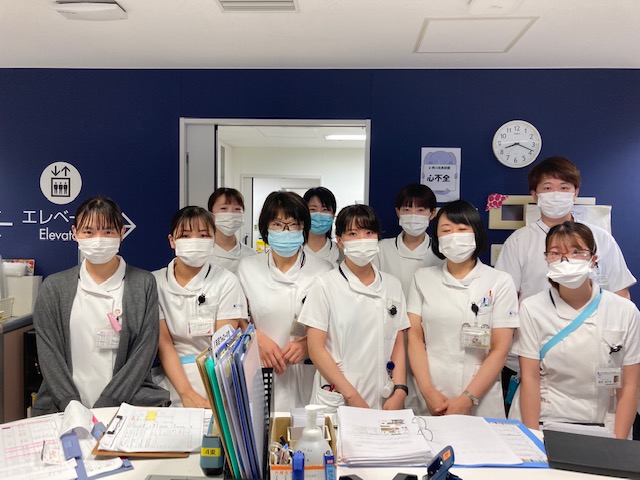
Patients with various diseases are hospitalized in the ward, so they often assist in operations and examinations, and it is a ward where they can acquire a lot of knowledge and skills. It's a busy day, but it's worth doing every day. I still have a lot of worries, but my seniors are kind and supportive, so it's very easy to work. (2nd year nurse)
4The Western Heart Center is a ward centered on cardiovascular Cardiology and Cardiovascular Surgery, with 33 general beds and a 12-bed C-HCU (Coronary = coronary artery disease / Cardiac = high care unit for the heart). treatment room).
In general hospital beds, we provide nursing care to patients undergoing examinations, internal medicine, and surgical treatments for cardiovascular diseases, as well as patients who are about to undergo heart or blood vessel surgery. In addition, for patients who have passed the acute phase, we provide guidance and rehabilitation to deepen their understanding of the disease in preparation for discharge or transfer.
The C-HCU accepts critically ill patients who have undergone treatment in the CCU (Cardiology Intensive Care Unit) and G-ICU/G-HCU (Perioperative Intensive Care Unit), providing bedside monitoring and artificial respiration. We provide nursing care for patients in an acute phase, such as managing equipment. Patients who have recovered from C-HCU are transferred to general wards such as 4West.
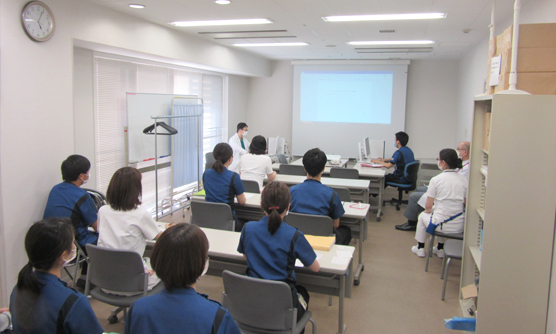
In the past few years, students from nearby nursing colleges and other institutions have conducted practical training, and high school students have had hands-on nursing experiences.
Even in the busy daily work, the staff are all smiling and full of energy in a workplace where they can cooperate with each other. There is also support such as study sessions, and you can learn a lot from seniors who have experience in various departments in the hospital, as well as specialized knowledge of the cardiovascular system.
4 West Heart Center is a heartful workplace where you can work happily and lively.
The north ward on the 4th floor consists of 8 G-ICU (general-intensive care unit intensive care units) and 16 G-HCU (general-high care unit advanced care units) beds.
The G-ICU and G-HCU have an Anesthesiology on staff at all times, and multidisciplinary teams such as nurses, clinical engineers, physical therapists, nutritionists, and pharmacists work together to provide team doctor care.
The G-ICU is mainly for patients with severe conditions who require intensive systemic care such as respiratory, circulatory, and metabolic management, such as those who have undergone Cardiovascular Surgery, surgery for esophageal cancer, or who have undergone a sudden change in their condition during hospitalization. You will be entered.
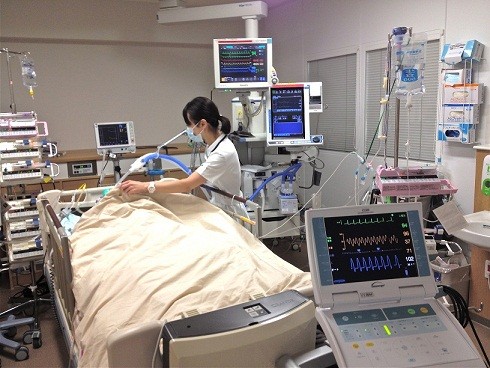
The G-HCU plays an intermediate role between the G-ICU and the general ward. Patients who have recovered from their illness in the ICU, and patients who have difficulty following surgery in the ward after undergoing general anesthesia surgery enter the G-HCU. will be We provide nursing assistance for early recovery by assisting in awakening from anesthesia immediately after surgery, early detection of abnormalities and prevention of complications.
In our department, there are many patients who are seriously ill and take a long time to recover. , you can feel the charm and rewarding of nursing in the critical care field. Nursing at G-ICU/G-HCU requires a variety of knowledge and skills. I am making good use of it.
The east ward on the 5th floor is a mixed ward for dental and oral surgery, Neurosurgery, Neurology, neuropsychiatry, and diabetic endocrinology.
Patients of each clinical department who are admitted to our ward are...
- Oral and Maxillofacial Surgery mainly includes jaw deformity surgery, sialolithectomy, and tumor surgery in the area of oral surgery.
- Neurosurgery mainly includes surgery and endovascular treatment for unruptured cerebral aneurysms, stroke, surgery for brain tumors, and head trauma
- Neurology, mainly intractable neurological diseases such as stroke, epilepsy, Parkinson's disease, and ALS
- In the Department of Psychiatry and Neurology, hospitalization for rest, environmental adjustment, and internal medication adjustment for people with depression, bipolar disorder, anxiety, etc. who are tired from stress in their daily lives and have insomnia.
- In diabetes and endocrinology, mainly diabetes control hospitalization, thyroid tumor surgery, and detailed examination of endocrine diseases
And so on.
The nurses on our ward...
Communication at work is lively, and we work every day with outstanding teamwork. In addition to nurses, we also collaborate with other professions. Nurses, doctor, pharmacists, registered Registered Dietitian, physical/occupational/speech therapists, and MSWs hold daily conferences to discuss what kind of interventions are necessary for patient recovery. Based on the opinions and information gathered there, we consider methods of rehabilitation in the ward and daily life support, and make arrangements for discharge at home. Various patients are hospitalized, from those undergoing medical treatment to those undergoing surgery. Let's work together.
The West Stroke Center on the 5th floor consists of a 12-bed SCU (Stroke Care Unit) and 33-bed wards. I am caring for a patient who is We provide treatment, care, and rehabilitation in collaboration with doctor, nurses, physical therapists, occupational therapists, speech therapists, registered Registered Dietitian, and others.
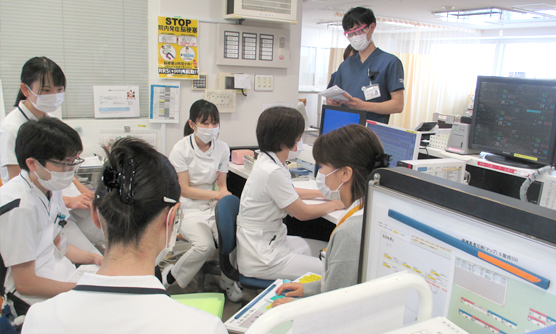
stroke center
In our ward, there are many patients with impaired consciousness or paralysis, so we hold a conference twice a week with not only nurses but also rehabilitation staff to share information so that we can bring out the strengths of the patients as much as possible according to their condition. undergoing rehabilitation.
SCU
The SCU (Stroke Care Unit) is a ward for patients who have suffered a stroke. After a stroke, it is said that appropriate treatment and starting rehabilitation as early as possible will affect subsequent recovery.
Because it is not long after the onset, many patients are in an unstable condition, but we provide treatment and nursing so that they can overcome the acute phase without complications. In addition, we hold conferences three times a week with physical therapists, occupational therapists, and speech-language pathologists to work together so that patients can receive rehabilitation safely.
In the south ward on the 5th floor, doctor, nurses, physical therapists, occupational therapists, nutritionists, and pharmacists provide nursing care so that patients can receive medical care safely and comfortably.
We value patient and family support care with a view to post-discharge life. I listen to the patient's living conditions and their family's thoughts before hospitalization, and incorporate them into my daily nursing care. We work closely with the patients and their families to ensure that they can safely live in the homes or facilities they lived in before hospitalization, in cooperation with the hospital's medical teams and the General Patient Support Department to make adjustments at home.
Nurses use the pair-nursing method, in which two nurses are assigned to each patient and provide nursing care. We provide educational guidance through OJT, which leads to self-growth.
The East Ward on the 6th floor provides day-to-day nursing care to cancer patients, mainly in the Department of Gastroenterological Surgery, Department of Gastroenterology Oncology, and Department of Endocrinology. Surgery performs surgery every day, internal medicine performs surgery such as endoscopic treatment and angiography every day, and endocrinology treats a wide variety of patients by taking radioactive iodine orally and treating them under special circumstances. doing. In addition, we accept many patients who have undergone emergency hospitalization or emergency surgery, and who are transferred from the emergency ward. Although it is a busy ward, we provide care for recovery from the intense pain that each patient faces, while providing palliative care for cancer patients who live the rest of their lives with general pain. We are also doing
From the beginning of hospitalization, the nurses in charge play a central role in providing daily care, relieving physical and mental pain, and adjusting lifestyles after discharge together with the patient and family so that the patient can spend a comfortable time with peace of mind. I am working on a plan. We hold conferences every day, strive to exchange and share information among staff, and strive to provide unified nursing care. In addition, we provide patient-centered team medical care while consulting with specialized nurses, certified nurses, and each professional team, and coordinating with co-medicals.
I always provide nursing care while asking what the patient's pain is and how they feel. It is our joy and encouragement to bring smiles to patients' faces.
I would like to introduce one scene of such nursing in 6 East.
We practice together with patients and their families so that we can always be close to patients, prepare physically and mentally, and be able to care for stomas independently after surgery.
We aim to provide nursing that seeks individuality in team medical care.
6 West Ward is a mixed ward consisting of Orthopedic Surgery, Gynecology, Breast Surgery, Rheumatology, and General Medicine. We provide nursing care for a wide range of pathological conditions, from preoperative and postoperative acute phases to rehabilitation and chronic phases. Since many patients are transferred to local hospitals, we have many daily discussions with the regional collaboration office, physical therapists, Registered Dietitian, and pharmacists, and support the medical care of patients as a team. Many of our patients are women, the elderly, and people with dementia, so we reupholster the walls of the hospital ward with pictures each season and give them handmade calendars and birthday cards so that they can feel the seasons. For patients with anxiety and delirium symptoms, we collect information from before hospitalization and aim to provide nursing care that fits the lifestyle and thoughts of the patient.
The nurses and nurse aides (nursing assistants) in the 6 West Ward range from veterans to newcomers.
The East Ward on the 7th floor is a mixed ward for Urology, Respiratory Sugery, Respiratory Medicine, Neurology, and Surgery.
Half of the patients are hospitalized for surgery, and other hospitalizations are for chemotherapy, treatment of inflammatory diseases such as pyelonephritis and urinary tract infections, and home adjustment for intractable neurological diseases.
Our ward is characterized by a short hospital stay. Although the length of hospitalization is short, we place importance on providing support tailored to each individual patient while maintaining close communication with a wide range of professionals.
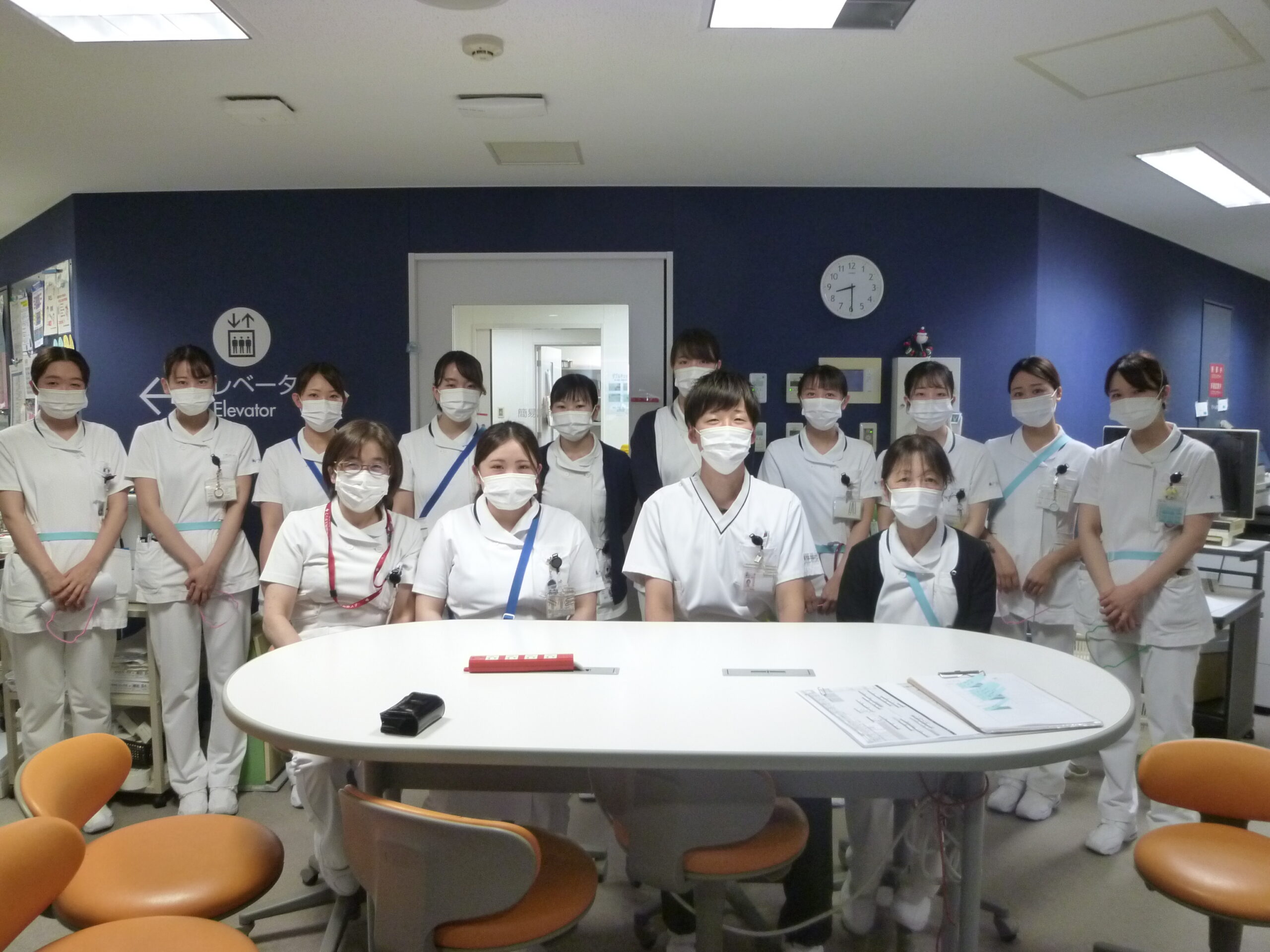
7 West Ward is a ward where patients of Respiratory Medicine, Respiratory Sugery, Gastroenterology, Dermatology, and Oncology are admitted.
doctor, pharmacists, and nurses work together to ensure that patients with chronic respiratory diseases, patients with acute respiratory failure, and patients undergoing chemotherapy and radiation therapy can receive treatment reliably, safely, and comfortably. Our teachers, physical therapists, occupational therapists, nutritionists, respiratory support team, palliative care team, and others will work together to provide support. In addition, we will cooperate with chronic respiratory disease nursing certified nurses, cancer chemotherapy nursing certified nurses, and cancer nursing specialist nurses to support long-term treatment and recuperation life.
Since there are many patients who continue to live with their illness even after they are discharged from the hospital, we are cooperating with the Regional Medical Promotion Division to arrange discharge so that patients and their families can leave the hospital with peace of mind.
Nurses with a variety of experiences, such as energetic young nurses, experienced veteran nurses, mother nurses who work hard while raising children, and reliable male nurses, will do their best to support patients and their families. Please come to West Ward 7 with peace of mind.
The east ward on the 8th floor is a mixed ward for Hematology and Ophthalmology. Among them, patients with blood diseases account for the majority, and we mainly care for patients with diseases such as acute leukemia, malignant lymphoma, multiple myeloma, and myelodysplastic syndrome. Blood diseases are relatively young, and many patients have sudden onset and are working on treatment. In particular, hematopoietic stem cell transplantation treatment is accompanied by strong physical and mental pain, so we hold multidisciplinary conferences every week to share information and work on nursing care for patients. In December 2014, we launched an LTFU (post-transplant follow-up) outpatient clinic to support patients so that they can lead a better life after being discharged from the hospital.
The ward has 3 sterile rooms and 9 semi-sterile rooms to accommodate transplants, and from 2021, CAR-T cell therapy is also being performed.
Since there are many patients who require long-term treatment, we work together with the regional medical promotion section to provide nursing care that focuses on the peace of mind of life after hospitalization and after discharge.
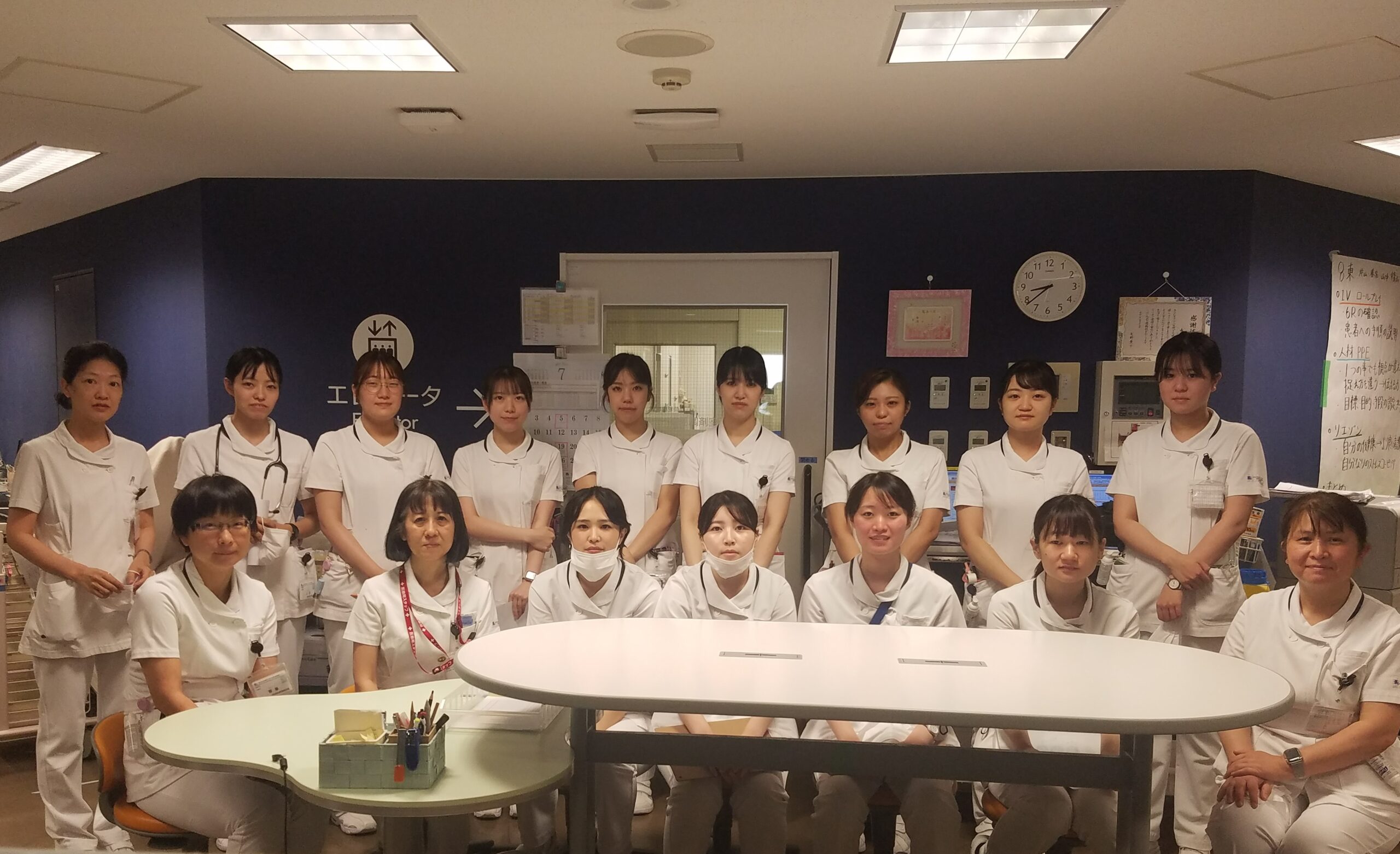
The West Ward on the 8th floor is for Otorhinolaryngology, Head and Neck Surgery, Orthopedic Surgery, Plastic Surgery, and General Medicine medicine.
First, let's talk a little bit about our specialty, nursing...
Head and Neck Surgery, there are quite a few patients who have lost their voice. Every day I am conscious of choosing the communication that suits each individual, establishing it together with the patient, and getting involved so that I can express my thoughts. Orientation is held before the surgery so that the patient can have an image of what the surgery will be like after the surgery, and also so that the patient can wish for the surgery. Since there are many patients who have had their larynx removed, we are confident in providing care to patients and their families regarding tracheostomy management.
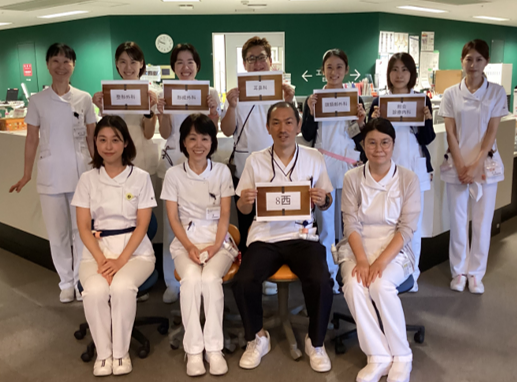
9 Higashi bursting with smiles 9 Higashi bursting with youthfulness 9 Higashi full of healing ♪ All for the patients...
A variety of patients are admitted to the 9th Ward, including those undergoing endoscopic examination and treatment, those undergoing surgery, those undergoing chemotherapy, and those undergoing catheterization. Let me tell you a little bit about what we do in it...
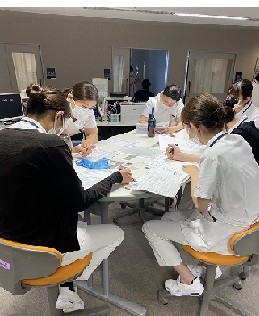
For example, when I feel sick after chemotherapy and can't eat well, we exchange information with a dietician, think about foods that are easy to eat, and try to meet the patient's wishes as much as possible.
In addition, when patients are repeatedly hospitalized, when treatment takes a long time, or when they do not recover as expected, I try to be there for them and provide them with mental support.
However, even though the pain continued after the surgery, the day after the surgery, I would say, "Let's go for a walk!" Because we know that early ambulation after surgery is deeply related to subsequent recovery.
``Basically gentle, but sometimes strict, and healing''
In addition, we are involved from the time of admission and after discharge, and if necessary, we cooperate with discharge support nurses and community medical centers to support from the time of hospitalization so that life after discharge can be carried out smoothly.
The atmosphere of the ward is full of youthfulness, energy and smiles. Even when we are busy working, there is an atmosphere where we naturally talk to each other and help each other♪ In addition to the first and second year education, we are enthusiastically conducting practical guidance at multiple nursing schools, but we are told that we will be strict. Rather, I practice warmly and calmly according to my personality. In addition, there are quite a few staff who have changed jobs, so it is an environment where you can sympathize with the problems unique to graduates.
The West Ward on the 9th floor consists of five departments: Infectious Diseases, Respiratory Medicine, Orthopedic Surgery, General Medicine, and Dermatology. As this ward is a core ward for infectious diseases, it has 1 type infectious disease bed (2 beds) and 2 type infectious disease bed (8 beds). It is characterized by many private rooms due to its structural speciality as an infectious disease core ward.
For patients with infectious diseases, we mainly care for patients with airborne infections. We provide care by accurately implementing preventive measures for each infection route and striving to prevent the spread of infectious diseases in the hospital as well as ourselves.
Every day is busy with many emergency hospitalization patients, but the ward is always full of energy with a cheerful staff. Staff who are serious about nursing sometimes struggle, but they move forward while thinking about "what is necessary for the patient...".
Nurses are not the only staff members of the West Ward on the 9th floor. There are also nurse aids, nurse supporters and ward concierges. We are working hard every day to make the West Ward on the 9th floor even better by cooperating with everyone.
central department
The Imaging Medicine Department is divided into five areas: Endoscopy Center, IVR Center, CT/MR, Nuclear Medicine, and Radiation Therapy.
In addition to routine examinations and treatments, nurses are also available 24 hours a day for emergency examinations and treatment. I am very happy when the symptoms of a patient who received emergency treatment recover, and I am proud to have been involved as a member of the medical team. The time I spend with patients is short, but I value the occasional interaction and work daily in collaboration with multiple professions so that the patient's pain and anxiety can be alleviated even a little, and that they can receive examinations and treatments with peace of mind. I'm in.
endoscopy center
At the Endoscopy Center, more than 17,000 gastroscopies and colonoscopies are performed annually, as well as examinations and treatments such as bronchoscopy, pancreatic and biliary system examinations, renal biopsies, and liver biopsies. The examination is performed under sedation with little pain so that the patient can take the examination comfortably. There are 12 recovery beds in the endoscopy center, so you can rest comfortably until you calm down after the examination. There are nurses who are licensed as endoscopists, which is also leading to career advancement for nurses.
IVR Center
The IVR Center offers cardiac catheterization, cerebral angiography, abdominal angiography, whole body angiography and endovascular treatment. Percutaneous coronary angioplasty, cerebrovascular treatment, catheter ablation, etc. are methods of treatment through catheters, and the content of treatment is progressing rapidly, and referral patients come from all over Japan.
Since 2017, a day center has also been opened and one-day cardiac catheterization is also performed. Nurses study and train themselves with multi-professionals so that they can quickly implement new treatments and serious cases such as E-CPR as well as stroke/chest pain hotlines.
CT/MR
Approximately 160 CT examinations are performed per day using three devices, and approximately 70 examinations per day are performed using four MR examinations. About half of them are patients undergoing contrast agent examination. We are working in cooperation with multiple occupations so that we can respond quickly to allergies.
nuclear medicine
In the nuclear medicine laboratory, PET examinations using radioactive isotopes and RI are used to perform examinations such as cerebral blood flow and myocardial scintigraphy. With the introduction of new tests and treatments, we also hold study sessions for nurses, and provide explanations and assist with tests so that patients can undergo tests with peace of mind.
radiotherapy
In radiation therapy, external irradiation (including whole-body irradiation, IMRT, and stereotactic irradiation), in which radiation is irradiated from outside the body using a dedicated treatment device, and tissues in which radiation is irradiated by placing or inserting radioactive materials in the body We also offer treatments such as internal and intracavitary radiation therapy.
Nurses work daily with doctor and radiological technologists to devise treatment environments so that patients can receive treatment safely and comfortably, and to alleviate side effects and treatment-related concerns. I am involved with the patient.
2 South
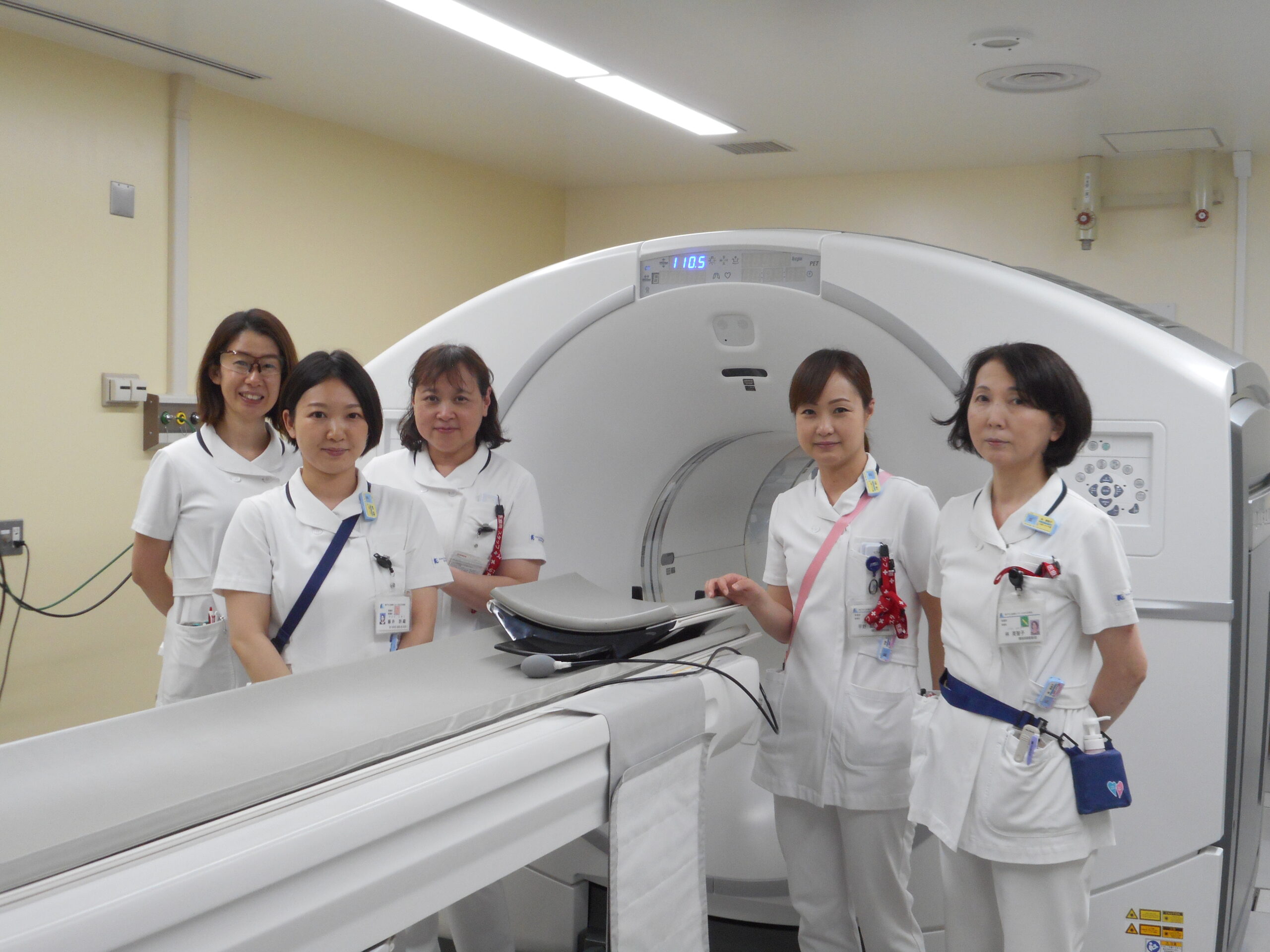
Welcome to Dialysis and Blood Purification Center
In principle, the center is intended for inpatients.
There are 12 beds, and the basic dialysis schedule is two courses in the morning and afternoon.
Target patients are...
- Continuation of maintenance dialysis for patients transported by ambulance
- Maintenance dialysis when a patient with renal failure is hospitalized for surgery, chemotherapy, examination, etc.
- Emergency hemodialysis and induction for acute renal failure in hospitalized patients
- Introduction of hemodialysis for patients with chronic renal failure
- General apheresis:
Plasma exchange (simple plasma exchange, double membrane filtration plasma exchange), plasma adsorption, blood adsorption, LDL adsorption, leukocyte removal therapy, ascites filtration concentration, endotoxin adsorption - Peripheral blood stem cell collection and bone marrow fluid concentration during stem cell transplantation
CAR-T cell therapy: Kymriah Breyange
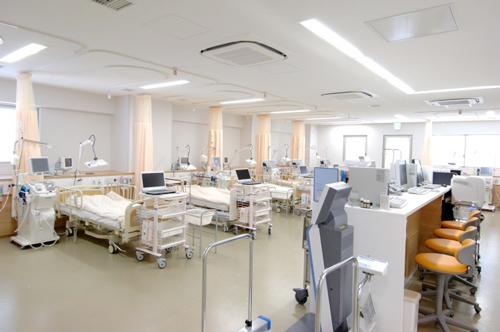
In our surgery department, we practice surgical nursing under the basic policy of "providing safe and comfortable surgical nursing throughout preoperative, intraoperative, and postoperative periods." It has 19 operating rooms (3 bio-clean rooms, 2 hybrid rooms) and is operated by 73 staff members (including part-time nurses).
As a tertiary emergency medical facility, we provide medical care and nursing 24 hours a day, so we accept emergency surgery 24 hours a day. We have a wide range of medical departments, including surgery, obstetrics and Obstetrics and Gynecology, Cardiovascular Surgery, Neurosurgery, Orthopedic Surgery, Urology, Otorhinolaryngology, Head and Neck Surgery, dentistry, Ophthalmology, Dermatology, and Plastic Surgery. more than 40 surgeries every day.
Since 2013, robotic surgery has been introduced, and Urology, surgery, gynecology, and Respiratory Sugery are performing surgery. 266 in 2018 and 295 in 2019.
In 2014, we were one of the first to introduce transcatheter aortic implantation (TAVI), which is a less invasive surgery for patients.
Surgical nursing requires a wide range of knowledge and quick and reliable skills, but becoming a specialist broadens the scope of one's own nursing and provides the ideal environment for self-growth as a nurse. For this reason, we regularly hold study sessions, etc., and constantly learn and acquire the latest knowledge and technology, and work on advanced medical care.
In recent years, there are many patients who want day care or shorter hospital stays instead of conventional inpatient care. For example, patients who want to receive treatment without sacrificing social activities as much as possible, patients who do not want to be separated from their families, patients who want to keep their financial expenses to a minimum, etc. I think there are various reasons.
By performing day surgery and hospitalization on the same day, time constraints and physical and economic burdens are reduced. I believe that the primary mission of the Day Surgery Department is to meet the needs of such patients so that they can receive treatment safely and with peace of mind.
For those who have applied for day surgery, the medical clerk and the day surgery coordinator nurse will explain in detail the examinations, supplies, preparations, and precautions necessary for the surgery at the Day Surgery Center on the 4th floor.
The day before the surgery, we will make a phone call individually to confirm the arrival time and ask about your physical condition so that you can undergo the surgery with peace of mind. After surgery, we will monitor your progress in bed as needed. Then, you will be instructed on precautions for daily life at home, internal clothes, changing gauze, etc., and then you will be sent home.
After surgery, we answer phone calls for inquiries on the day of surgery, ask about postoperative progress, self-care status, and any concerns, give appropriate advice, and live with peace of mind until the next outpatient visit. I try to make sure that you do.
In addition, our center has a PACU (post-general anesthesia recovery room), which has a recovery function after general anesthesia surgery, performs post-operative recovery evaluation, and has a role to safely hand over to the ward.
Patients who wish to have day surgery should consult with doctor in charge. Experienced nurses are waiting for you at the Day Surgery Center on the 4th floor.
Nurses in the General Patient Support Department collaborate with medical social workers and clerical staff to provide discharge support, consultation, and regional cooperation. The pre-hospital preparation center checks in advance the necessity of continuing medical care and nursing care, with a view to the patient's life after discharge.
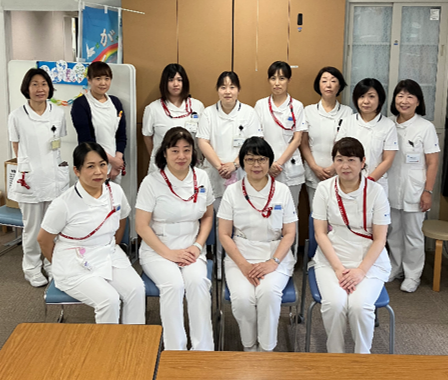
Education/Efforts
Introduction
At Kobe City Medical Center General Hospital, based on the philosophy of the hospital and the philosophy and policies of the Nursing Department, each nursing staff member grows as a professional and contributes to the organization. We aim to develop our staff.
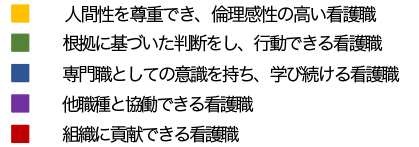
Nursing staff image that our hospital aims for
In order to provide high-quality nursing care centered on patients and their families, while providing nursing care focused on the acute phase, we have set up the following image of nursing staff and are developing the skills of staff. I'm here.
- Patients can be treated as consumers and their individual needs can be understood
- Nursing in the main clinical department of the department can be independently practiced according to the individuality of the patient
- Support is available to other professions as needed to meet patient needs
- Accurately grasp the patient's intentions and connect it to support
- Abide by the rules of the Nursing Department /department, and be assertive when you notice that others are wrong
- Understands department goals and can perform assigned tasks
- Understand your own issues from the current situation and work on learning independently
- Participate in departmental reporting and research groups
- think about your career
About our capacity development
Education is very important for nursing staff to work energetically. At our hospital, we have introduced a clinical ladder to improve clinical practice skills. Through the ladder, we support each individual's goals and proactive learning so that they can grow in a well-balanced manner in nursing practice ability, organizational role performance ability, and self-education/research ability.
Click here for Kobe City Hospital Group Nurse Clinical LadderIn-hospital training
The in-hospital education and training organized by the Nursing Department is based on the Ministry of Health, Labor and ministry of Health, Labor and Welfare notation 's "Guidelines for Training New Nursing Staff [Revised Edition]" and "Guidelines for Utilizing the Clinical Ladder for Nurses (Japanese Nursing Association Edition) 3. Learning Contents". We are planning and implementing.
- Aiming to reach Step 2 of the clinical ladder by the third year after graduation, we conduct training to ensure that students acquire the basics of clinical practice during regular hours.
- The follow-up training and mid-career training are planned as career support training for nursing staff in their 4th year and above who are aiming for ladder 3 to 4 to further improve their knowledge and skills. (Limited number of people).
Basic training
1st year training
Acquire the basic attitude, basic knowledge and skills as a nursing staff working in an acute care hospital
<Group training content>
- Orientation for newly hired nursing staff, welcome training
- Skill training 1 and 2: physical assessment (respiration, circulation, cranial nerves, digestive system), perioperative nursing
- IV nurse steps 1, 2, 3: ethics of intravenous injection, blood sampling, blood glucose measurement, handling of infusion pumps and syringe pumps, anatomy and physiology required for intravenous injection, knowledge of drugs, venipuncture techniques, central venous route management, cardiovascular drugs and blood transfusion, knowledge of narcotics and contrast agents
- peer counseling
- Communication I: Understanding Others and Expressing Emotions
- Nursing Perspective I: Understanding Patients, Fundamentals of Nursing Ethics
- Teamwork I: Membership
- Safety management
- Infection control
- Dealing with multiple issues
<OJT>
- Orientation at assigned department
- Acquire basic nursing skills using nursing standards, procedures, and manuals
- Learn roles as a member of a department such as day shift and night shift
- Participate in study sessions that take advantage of the specialties of the assigned department
- Sudden Change Response (BLS)
2nd year training
Acquire the knowledge and skills to develop nursing care according to the patient's individuality, and perform standard nursing independently
<Group training content>
- Sudden Change Response (ICLS)
- Skill training 3: end-of-life care
- Communication Ⅱ
- Nursing view Ⅱ, Ⅱ
<OJT>
- Work on the nursing practice of the patient in charge
- Deepen the understanding of patients and their families through daily practice
- Participate in departmental team activities, study sessions, etc.
3rd year training
Able to grasp the whole picture of the patient and practice nursing with individuality and continuity
Cultivate your own perspective on nursing through case reporting
<Group training content>
- Nursing Ethics III
- Communication Ⅲ
- Nursing Perspective IV: Case Report Presentation
- Teamwork II: Leadership training (4th year)
<OJT>
- Develop individualized nursing care through assigned nursing
- Learn the role of team leader
- Experience leadership duties and practice teamwork
- experience emergency response
Follow-up training (one-time training), middle-level training (series training)
Follow-up training
One-off training by theme that applicants can participate in (there is a limit on the number of participants)
- Comprehensive community care
- Decision support
- reflection
- Communication IV
Mid-career training
Training that can be attended by those who wish to participate throughout the series (limited number of people)
- Nursing Ethics IV ①~③
- career management
Nursing skill instructor training
Nursing staff who play a leadership role participate once a year, and by passing on correct knowledge and skills to staff in their departments, local rules are eliminated and evidence-based unified nursing practice can be carried out.
- Pressure ulcer prevention care
- bladder indwelling catheter
- oxygen therapy
- suction therapy
- tube feeding
Lifesaving technology instructor training
Since it is an acute care hospital, all staff must have the knowledge and skills to deal with sudden changes. A department representative participates in the instructor training once a month and conducts training, and conducts BLS training in the department for all members. In addition, it also serves as training for instructors and facilitators of the second-year sudden change response training.
Training for educators and on-the-job instructors
We plan and manage training content in accordance with the guidelines of the Ministry of Health, Labor and ministry of Health, Labor and Welfare notation. Departmental education leaders and first-year education leaders participated in the seminar, and gave an overview of the Ministry of Health, Labor and Welfare guidelines, our educational philosophy, and educational theories (adult learning and child learning, ID theory, coaching and teaching, reflection, etc.). learn.
others
We conduct training for IV nurse judges, nurse aid training, training for each position, and training for all employees (manners training, safety training, infection training, etc.).
This training enables students to learn knowledge and skills related to specific fields and fields, to practice grounded nursing, and to proactively solve everyday questions and issues. There are specialized nursing training (cancer nursing, perioperative period, etc.), training sponsored by specialist nurses and certified nurses, and training sponsored by each medical team.
specialized training
This training enables students to learn knowledge and skills related to specific areas and fields, to practice grounded nursing, and to proactively solve everyday questions and issues. Specialized training is conducted mainly by specialist nurses, certified nurses, and nurses with specialized qualifications in specific fields. You can also participate in workshops organized by the in-hospital team medical care.
Cancer Nursing Specialized Training
Training aimed at learning the basic knowledge and skills of cancer care and nursing so that they can comprehensively assess cancer nursing and their families and provide appropriate nursing, and become proactively involved in cancer nursing. am. Lectures are given not only by nurses, but also by doctor and pharmacists.
Sudden response training
This training is centered on certified emergency nurses, nurses specializing in nursing for acute and critically ill patients, and nurses certified by the Japan NP Association.
Pressure ulcer, wound, stoma care training
Led by certified skin and continence care nurses, stoma training includes postoperative stoma replacement, pressure ulcer/wound care includes training on how to apply and select diapers, pressure ulcer assessment methods, and mattress selection.
Geriatric Nursing Professional Training
Led by dementia nursing certified nurses and geriatric nursing specialist nurses, you will learn how to deal with dementia patients, including the understanding of the elderly.
Diabetes Nursing Professional Training
With a focus on diabetes nursing certified nurses, doctor, nutritionists, and pharmacists serve as lecturers to learn not only the basics of diabetes nursing but also the latest diabetes treatment and nursing.
Respiratory Care Professional Training
Intensive care certified nurses, acute and critical care nurses, respiratory therapy certified nurses, doctor, clinical engineers, and physical therapists serve as instructors, and lectures related to respiratory care (ventilator mode, oral care, Postural drainage methods, oxygen therapy, etc.), and how to practice the operation of the ventilator used in the hospital.
nurse aid training
This training aims to acquire the basic knowledge necessary for nursing assistance work.
- Infection prevention
- medical safety
- Hygiene care, meal assistance
- BLS
In-hospital Nursing Research Presentation
Nursing research activities are supported by in-hospital research supporters (graduates who graduated from graduate school), from research planning to presentation. Depending on the content of the research, the research ethics review board (IRB) of the entire hospital is subject to examination, so we also provide introduction support so that the IRB examination can be done smoothly.
Every December, we hold an in-hospital nursing research presentation as an opportunity to present and share the results of each research and daily nursing.
Out-of-hospital training, dispatch/study abroad system for career advancement
As a nursing professional, you can voluntarily participate in educational training outside the hospital, such as training related to nursing associations and sponsored by nursing societies. Every year, the Corporate Headquarters sponsors training for employees in their first year of employment. In addition, mid-career nurse training (8th year), 10th year training outside the hospital, and 15th year training outside the hospital are planned for career advancement. For those who want to further advance their careers, there are short-term nursing staff dispatch and long-term study abroad programs.
Refresher training for new hires
For those who want to improve themselves as professionals, the following systems are available.
| Long-term study abroad program | Dispatch to nursing universities and research institutes in Japan and overseas for 6 months. (3 years or more in office) |
|---|
Short-term domestic dispatch system Dispatch to domestic medical institutions, educational institutions, research institutions, etc. for a maximum of 3 months. (3 years or more of employment) Short-term overseas dispatch system Dispatch to overseas medical institutions, educational institutions, research institutions, etc. for up to 3 months. (Worked for 5 years or more)
Senior students who took advantage of short-term dispatch and long-term study abroad programs
How did you develop your skills by using the system, is it useful now, and has it helped you advance your career?
I wanted to continue working in acute care, so I learned about the dementia nursing certification course and used the study abroad program. The training was a good opportunity to think about the practice up to that point. I am currently in the ward, but with the understanding of my superiors and staff, I am gradually starting to work as a certified nurse.
When I was in my tenth year as a nurse, I was asked what kind of nurse I wanted to be in the future in an interview with the head nurse, and I chose the path of becoming a certified nurse. The half-year education was very refreshing, and now I have a good network with people outside the hospital and I am doing a fulfilling job.
Enrollment in a master's program at a nursing school in Japan in order to promote creative academic research in nursing and to develop highly skilled professionals with specialized knowledge, skills, and a scientific perspective, as well as educational leaders and managers. It is a system that supports For those who have been employed for 5 years or more.
I went to graduate school because I wanted to do clinical research on pressure ulcer care. Now, I am interested in postoperative wound care, and I would like to think about nursing in relation to the characteristics and trends of wound treatment and skin care for patients in the entire ward. I am also active as a supporter of nursing research in the hospital, and my days are fulfilling.
Acceptance of practical training and training from outside the hospital
As a key hospital in Kobe City, our hospital accepts a wide variety of patients, and actively accepts nursing students and nursing graduate students for practical training. In addition, we also accept inquiries about research cooperation by graduate students.
clinical research
About clinical research
Currently, the Nursing Department is conducting the following clinical research.
In this research, we will use the data (information) obtained from the patient's daily clinical practice.
If you object to the use of your data for this research, you can stop using the information or providing it to other research institutions at any time. If you would like to know more about the research plan or content, if you have any objections to the use of your data in this research, or if you have any other questions, please contact us.
| Research subject name | Person in charge of our hospital | Explanatory text (PDF) |
| Nursing practice in the treatment of hereditary breast and ovarian cancer syndrome at our hospital | Yumiko Fujimura | |
|---|---|---|
| About hospital outbreak of new coronavirus infectious disease | Akiko Ogura | |
| Factor analysis of postpartum depression in our hospital | Junko Suekami | |
| Monitoring Catheter-Related Event Occurrence with Change in Duration of Peripheral Intravenous Catheterization | Shinkai Houshi | |
| Support in ambulatory cardiac rehabilitation for patients with tachycardia heart failure requiring activity adjustment | Mayuko Takahashi | |
| Factor analysis of central line-associated bloodstream infection | Akiko Ogura | |
| Holistic palliative care for patients with end-stage heart failure | Sanae Tagawa | |
| Nursing care for patients who underwent intraluminal urinary diversion after the introduction of enhanced recovery after surgery | Fumiko Ushiroyama | |
| Efforts to reduce the contamination rate of blood culture tests -feedback on contamination status- | Akiko Ogura | |
| Toward the construction of a perioperative care bundle program for the prevention of surgical site infections after Cardiovascular Surgery | Shinkai Houshi | |
| Factors that prolong the recovery time of one-day prostate biopsy and details of nursing intervention | Junko Maeda | |
| Investigation of newly detected drug-resistant bacteria before and after strengthening contact prevention measures | Shinkai Houshi | |
| Surveillance of drug-resistant bacteria in patients with a history of medical exposure overseas | Shinkai Houshi |
Specialized Nurse, Certified Nurse, Specific Nurse
In the social situation surrounding medical care in Japan, medical care is becoming more advanced, more complex, and more specialized, and a wider range of specialization is required for the roles played by nurses. In order to respond to these changes, the Nursing Department is focusing on training specialized nurses and certified nurses.
Currently, many specialist nurses and certified nurses certified by the Japanese Nursing Association are enrolled in our hospital, and they are active in committee and team activities in collaboration with doctor, making use of their expertise, including clinical practice in each department. increase. In particular, I work as a lecturer for basic training and specialized training in specialized areas within the hospital, working to improve the quality of nursing within the hospital. In addition, we are expanding the scope of activities, such as dispatching to local facilities in addition to hospitals.
In the Nursing Department, we would like you to utilize the specialized knowledge and skills of certified nurses and members of various team associations so that patients can receive necessary care by coordinating hospitals and communities. You can consult or visit us. Please contact the Nursing Department if necessary.
area of expertise
Cranial nerve disease (stroke, head injury, intractable neurological disease, etc.) 1 person
Cardiovascular disease/kidney disease 1 person
| Activity content |
|
| comment |
Understanding the disability, life difficulties, and anguish of patients with chronic diseases such as diabetes, kidney disease, heart disease, and cranial nerve disease, and providing continuous support from the hyperacute stage to the recovery stage, regardless of ward or outpatient. We support this. Based on the specialized treatment of each disease and the course of the disease, we utilize specialized knowledge and skills and collaborate with multi-professional and local supporters so that patients can live with their own bodies and disabilities. While doing so, I will continue to support them as life companions. |
Supporting patients with high urgency and severity and their families, coordinating among medical staff, etc., and working across the hospital to provide the best medical care. increase. Each CNS belongs to GICU, EICU, 7 Nishi (Respiratory Medicine Ward), Nursing Department Management Office (Hyogo Prefecture Organ Transplant Coordinator), and they are active inside and outside the hospital while making use of their individuality and cooperating. .
In-hospital activities
RST
In order to improve respiratory care throughout the hospital, we are working on a wide range of activities such as in-hospital rounds and study sessions in cooperation with core nurses and link nurses.
CIFT (Critical Illness Follow-up Team)
In recent years, the existence of post intensive care syndrome (PICS), which hinders social reintegration after being admitted to the ICU due to severe illness, has attracted attention. In addition to working with patients during their stay in the ICU and after discharge, we also provide follow-up services from the time they are discharged from the ICU to the time they are discharged from the hospital in cooperation with other professionals. Our hospital was the first in Japan to establish an ICU follow-up outpatient department, and we are working to support patients and their families after discharge.
Critical Care Division Family Support Team
We work with medical social workers and psychiatric nurses for the families of patients who have been admitted to the ICU or CCU in an emergency.
In addition to family nursing provided by nurses belonging to the critical care department, nurses act as spokespersons for families from a neutral standpoint and play a role as a bridge between ward staff and the patient's family.
We mainly provide proxy decision-making support, ethical coordination, end-of-life family care, and support for financial concerns, and continue to support the family even after the patient leaves the ICU.
I think that the elderly are living with various diseases and difficulties in life. There may be many worries about how to proceed with treatment and life in the future. I would like to understand the values and way of life of such elderly people and help them to organize their recuperative life.
In an acute care hospital like our hospital, it is easy for patients to develop delirium or worsen the symptoms of dementia due to changes in the environment of hospitalization and physical disorders. For such elderly people, we provide preventive care so that they can receive treatment safely, and we provide care with a multidisciplinary team so that they can receive treatment comfortably while trying to alleviate their pain.
In addition, there are many elderly people and their families who are unsure about how to choose a treatment or place of recuperation. We listen to your thoughts and support you so that you can live your own way while consulting with a multi-professional team.
I would like to support the elderly so that they can live their own way of life even with old age and illness.
As a pediatric nurse, I place great importance on helping children and their families with various health problems grow and develop in a healthy manner both in the hospital and in the community. We also work to ensure that care that protects the rights of children and families is provided in pediatric medical settings.
Support for alleviating anxiety and pain of hospitalized children and their families
For children and their families, suddenly visiting a hospital can be very unsettling and scary, and the treatments and tests necessary to cure an illness or injury can be painful. For this reason, we strive to provide care that minimizes pain by providing explanations that are easy to understand, not only verbally but also visually, according to the child's developmental stage.
Support to promote the growth and development of hospitalized and outpatient children and their families
In the pediatric ward, we hold daily meetings with doctor to share information about hospitalized children and work together to ensure a smooth return to life after discharge. Additionally, for children and their families who continue to receive outpatient treatment for chronic illnesses, we support them in achieving tasks that are appropriate for their growth and development while continuing to take recuperative actions to help them cope with their illness. We also provide consultation to families regarding childcare issues and advice on accident prevention according to the child's developmental stage. We provide support so that hospitalization and outpatient visits not only cure illnesses, but also provide opportunities to solve problems that are appropriate for the child's growth and development.
Support for children whose family members are hospitalized due to illness or injury
No matter how young a child is, they are very worried if a family member is hospitalized. Furthermore, some children become even more anxious because they don't know anything. Staff from the department where the family is hospitalized or going to the hospital provide consultation, and work with the family to help the child understand what is happening to the family, and provide support to the child.
Support for training staff involved in pediatric nursing
In the pediatric ward, we hold study sessions that incorporate practical skills for new nurses so that they can acquire knowledge and skills in pediatric nursing. In addition, the professional nurses themselves serve as practical models and strive to improve the quality of nursing throughout the ward. We also conduct research to visualize the results of our efforts with staff and link them to the development of pediatric nursing.
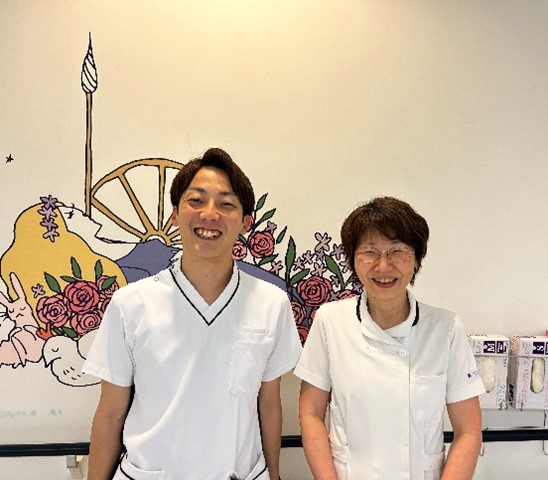
Cancer nursing specialist nurses practice nursing while understanding the total pain of cancer patients and their families who have various symptoms, anxiety and worries. We provide decision-making support for treatment and recuperation, collaborate with other healthcare professionals, and support people to live their lives to their full potential despite their illness. Aiming to improve the quality of cancer nursing as a Regional Cancer Treatment Cooperation Base Hospital, we are also working on cancer nursing education.
Activity content
- Patient and family care and staff support at cancer centers and chemotherapy centers
- Palliative Care Center, Clinical Ethics Consultation Activities
- Cancer Nursing Consultation Outpatient Consultation Support
- Cancer nursing education (inside and outside the hospital), end-of-life care (ELNEC-J) training
- Promotion of ACP (advance care planning)
- Participation in cancer boards and conferences
Cancer Nursing Consultation Outpatient
| date and time | Monday-Friday 10:00-16:00 |
|---|---|
| place | Cancer Center Block C Room C287 |
| content |
|
The word liaison has the meaning of "connecting" or "bridging", and liaison psychiatric nursing uses the knowledge and skills of psychiatric nursing to "connect the body and mind" to help patients with physical illnesses. It is a nursing field that deals with mental problems and issues that people have.
In acute care, patients are faced with rapid physical changes and sometimes suffer from mental disorders. In such cases, we support mental health from a professional perspective together with medical staff so that the person can return to a normal life as soon as possible.
In addition, I am involved in mental health support and educational support for nurses so that they can be active on the front line.
Liaison nurses are not assigned to specific departments, but they freely go to departments where they receive consultations or requests, and develop cross-organizational activities.
We conduct surveillance with the goal of reducing hospital-acquired infections, and take infection control measures based on EBM.
As a member of the infection control committee/infection control team, I work across the hospital and think about infection control that can be put into practice with nurses on site.
Efforts are also being made to prevent occupational infections, such as vaccination and prevention of needle sticks.
Emergency Nursing Certified Nurses work to ensure that patients receive accurate treatment smoothly while quickly judging the degree of urgency and severity at the scene of an emergency.
In addition, in order to respond to general emergency medical care on a 24-hour basis, the goal is to maintain and improve the practical ability of emergency nursing and to provide life-saving technical guidance.
The four main activities are as follows.
- Nursing practice based on physical assessment as a role model
- Holding a triage workshop assuming a simulated patient
- Holding BLS/ICLS study sessions on how to deal with sudden changes in the hospital
- Disaster drills for responding to disasters
In recent years, with the development of medical care, it has become possible to recover from serious illnesses and elderly people. Our certified intensive care nurses use observation and nursing skills based on the latest broad knowledge to care for our patients. While assisting in life-saving medical care and observing with predictions, rehabilitation is started from the hyperacute stage, aiming for early recovery of the patient. We also provide safe care for families who are feeling uneasy.
At our hospital, intensive care certified nurses work not only in the critical care unit (ICU/CCU) but also in various general wards. We also hold study sessions and in-hospital training on acute stage pathologies, treatment, and nursing in an effort to improve the knowledge and skills of our staff. We also work as an in-hospital respiratory support team (RST). RST works together with doctor, clinical engineers, physical therapists, nurses, and other professionals to help patients receive safe and comfortable respiratory management.
I am a certified neonatal intensive care nurse.
Premature infants in the acute phase immediately after birth and newborns with illnesses are very unstable in their general condition and change rapidly. Therefore, while confirming the treatment policy with the doctor, we predict the patient's condition and provide nursing care so that the general condition can be stabilized as soon as possible. In addition, we strive for early detection of abnormalities by looking at the detailed signs of newborns, and in order to provide nursing care suitable for each newborn, we plan the timing of care and make decisions such as positioning so that rest can be maintained. She also actively provides family nursing care, helping mothers who were forced to separate from their babies immediately after birth, and providing psychological support to help parents in critical situations build a good parent-child relationship with their newborns. increase.
In addition, in order to improve the quality of nursing care, we receive consultations on care from ward nurses and hold study sessions.
Introduction of activities
Joint round with doctor
At the bedside of the newborn, I receive information about the progress of the newborn from the night shift worker, and discuss treatment, nursing, and future policies with the doctor.
Practical guidance
Together with ward nurses, they are in charge of newborns and provide practical guidance on assessment content and care plans.
conference
We discuss nursing content with ward nurses, formulate and evaluate nursing care plans, and share nursing content throughout the ward.
There are 19 operating rooms, and operations are performed in many departments, including not only surgery but also internal medicine. The number of surgeries exceeds 9,000 per year, of which 15% are emergency surgeries, and as an operating room for a hospital with an emergency and emergency center, we are available 24 hours a day to handle all types of surgeries. The indications for surgery are expanding to include the elderly and high-risk patients with comorbidities, and our hospital also performs many endoscopic surgeries, robotic surgeries, complex surgeries performed in multiple departments, transplant surgeries, and low-risk surgeries. We perform advanced and cutting-edge medical care such as invasive transcatheter surgery.
Surgical care is performed by a team consisting of surgeons, Anesthesiology, clinical engineers, and other professionals, and nurses are also required to have a higher level of expertise in surgical nursing. To ensure patient safety, we are implementing time-outs, introducing check sheets, and preparing manuals. In addition, for new employee training, we create programs and hold study sessions to help employees acquire specialized knowledge and skills.
Perioperative nursing requires preoperative psychological support, predicting the risk of complications that may occur during surgery, and assisting patients in safely undergoing surgery and promoting postoperative recovery. For this reason, we provide training for ward nurses to make them aware of the care that will be provided during surgery and to make use of it before and after surgery. As a certified surgical nurse, I am able to provide knowledge and skills based on theory, and strive to improve surgical nursing, including training staff and improving the environment, so that patients can undergo surgery with peace of mind and recover smoothly. We would like to support you.
For patients undergoing cancer chemotherapy, we perform symptom management during the use of anticancer drugs and support them to maintain their QOL. Cancer chemotherapy nursing certified nurses provide care so that patients can receive treatment with a sense of security while minimizing side effects. We have set up a consultation desk for outpatient chemotherapy patients who are having trouble with side effects at home, and provide various consultations so that they can be supported not only physically but also mentally. We also hold study sessions for generalists so that nurses can confidently face cancer chemotherapy patients.
Radiation Oncology Nursing Certified Nurses help all patients undergoing radiation therapy to complete treatment safely and painlessly.
- For patients who are unsure about whether or not to receive radiation therapy, we provide information such as what kind of treatment radiation therapy is and how they should live while undergoing treatment, and advice on how to think about treatment options. increase.
- For patients who have side effects associated with treatment, we work with them to think about ways to prevent their symptoms from worsening or to alleviate them, and help them put them into practice.
- For patients who are anxious about the treatment environment, we will prepare an environment where patients can receive treatment without anxiety, such as thinking about pain-free postures and ways to relieve pain according to the content of the patient's anxiety.
- In addition, we will provide as much support as possible to resolve the patient's concerns and questions, such as consultation on work-life balance and post-treatment symptoms.
Breast cancer nursing certified nurses provide support from a professional perspective so that people undergoing breast cancer treatment (surgery, chemotherapy, radiotherapy, hormone therapy) can live as normal a life as possible.
- Emotional care after receiving bad news
- Assistance in making treatment choices
- Helping you cope with treatment side effects
- Support according to changes in appearance (consultation on post-operative assistive devices, wigs for hair removal, etc.)
- Consultation about medical treatment environment
- Consultation on hereditary breast cancer, etc.
Introduction of activities
breast cancer Outpatient Care
Breast cancer nursing certified nurses provide the above support to outpatients twice a week (Wednesday and Friday).
joint conference
doctor, nurses, and pharmacists meet once a week to discuss how to provide the best treatment and care for patients.
activity
Elderly patients and patients with dementia may easily become confused due to sudden changes in their physical condition or unfamiliar hospital environments, and may find it difficult to convey their feelings accurately.
We place importance on listening to the voice of the patient, and support the continuation of patient-centered treatment and a calm and safe recuperation life.
We provide interventions using specialized knowledge and skills for patients who require intensive care in the fields of wounds, stomas, and incontinence.
In wound care, we provide nursing care that prepares a wound healing environment for various wounds including pressure ulcers.
In stoma care, we intervene before gastrointestinal/urinary stoma construction, position the stoma, prepare the local environment, and provide psychological support. After surgery, we support the acquisition of self-care, the selection of appliances, and how to deal with troubles. In addition, we collaborate with doctor not only for stomas but also for complex fistula care.
Incontinence care involves assessing the type of incontinence, implementing management methods using incontinence tools, and skin care to maintain healthy skin physiology.
We provide guidance to in-hospital nurses so that patients can continue to receive these care.
We also work with local visiting nurses to maintain continuous care even at home.
Swallowing function declines with age. In addition, invasiveness such as disease and injury will further reduce the function. I practice daily nursing care such as assessment, evaluation, training methods, risk management, and coordination with other occupations for patients with dysphagia.
Also, approaching patients with eating and swallowing disorders cannot be done by nurses alone. It can only be done through the collaboration of other professions such as doctor, doctor, speech pathologists, and Registered Dietitian. In collaboration with those occupations, we provide support so that meals can be eaten safely as soon as possible.
Careful observation of symptoms, complications, and pain that may occur in patients from the early stages of so-called stroke, such as cerebral infarction, cerebral hemorrhage, and subarachnoid hemorrhage, and striving for early detection will lead to treatment. We are trying to connect and prevent the worsening of symptoms.
Stroke can cause sudden onset of disorders that interfere with daily life, such as movement disorders, language disorders, and higher brain dysfunction. With the goal of allowing patients with these symptoms to return to society, we are working on rehabilitation while managing blood pressure, pulse, etc. from an early stage. This rehabilitation is based on a rehabilitation plan tailored to each patient's symptoms and conditions in collaboration with many medical professionals such as physical therapists, occupational therapists, speech pathologists, and doctor in charge of the patient. going. In the life of the ward, I am involved in improving the living environment and devising ways to increase the number of things patients can do on a daily basis.
The period of treatment at our hospital is very short, but the life after that is long. Among them, there are those who have recurrent strokes and are readmitted to the hospital. Recurrence of stroke is known to make symptoms worse, so it is said that it is very important for patients to prevent recurrence. We would like to work together with patients to think about ways to improve their lives to prevent such events.
activity
Chronic heart failure is a progressive condition in which cardiac function declines with repeated acute exacerbations. Because it is an internal disorder, it is difficult for those around them to understand the anguish of the patient, and they live with many physical, psychological, and social problems.
Chronic heart failure nursing certified nurses assess the aggravating factors of heart failure, think together with the patient about recuperation life according to cardiac function, respect self-determination, and support recuperation life behavior that values the individual. increase. In addition, at the end of life, we support the decision-making of patients and their families, and provide support in collaboration with multidisciplinary professionals while considering together the patient's desired end-of-life care.
Affiliation
We have one chronic heart failure nursing certified nurse in our hospital.
- outpatient heart center
Specialized training for in-hospital nurses
Specialized training for in-hospital nurses
We aim to improve our knowledge and skills so that all hospital nurses can support patients with heart failure. Nurses working in various settings participate and learn together.
Specified behaviors for nurses are assistance in medical care performed by nurses, and 38 behaviors that require nurses' practical understanding, thinking, and judgment, as well as advanced and specialized knowledge and skills. defined as an act. In order to carry out the act, you will be able to act as a specified nurse by receiving the training stipulated by law and obtaining approval.
Procedures are prepared in advance for these actions, and the doctor issues instructions in consideration of the patient's condition and the ability of the nurse. As a result, it is expected that nurses will be able to do things in a timely manner that could only be done by doctor, and that the recovery of patients will be accelerated.
At our hospital, we have established a system in cooperation with doctor so that designated nurses can carry out the procedure more safely.
Details of specific acts (as of 2022)
- Respiratory related (related to artificial respiration therapy)
- Drug administration related to nutrition and water management
- Drug administration related to hemodynamics
Due to the system restructuring in 2020, critical care certified nurses have integrated the previous emergency nursing and intensive care certifications, and have become a field that also includes specific activities.
Critical care is a field of nursing that deals with the reactions of seriously injured patients in life-threatening situations. We are required to provide high standards of nursing care in all settings, including emergency and intensive care areas.
Our hospital provides advanced and cutting-edge medical care, and the role of a certified critical care nurse is extremely important. Our roles are important, but we work energetically with our wonderful staff every day.
Main activities
- Practice, guidance, and consultation in the critical care field
- Follow-up after leaving the ICU (CIFT)
- General matters related to specific acts (practices, training management, etc.)
Dental hygienist
In recent years, various studies have clarified the relationship between oral health and systemic health, and attention has been paid to the importance of oral care. In particular, for those with general anesthesia, cancer treatment, respirators, or those with a weakened immune system, professional oral hygiene is provided to prevent or reduce complications and side effects associated with disease treatment. Management is recommended. Dental hygienists work in partnership with nurses and other healthcare professionals to support patient care through oral care and dental health guidance.
Activity content
Assistance for outpatient care
At the dental and oral surgery outpatient clinic, we strive to assist patients with their medical care while paying attention to safety so that patients can receive dental treatment with peace of mind.
Professional oral hygiene management for hospitalized patients
Responsible for oral hygiene management from a specialized perspective such as cancer treatment (cancer chemotherapy, head and neck radiation therapy), hematopoietic stem cell transplantation, stroke, etc., reducing oral complications and side effects associated with treatment, and preventing pneumonia. do my best.
Dental health guidance by the perioperative support team
For patients undergoing surgery under general anesthesia, we explain how to care for the mouth and dentures to prevent postoperative pneumonia. We also introduce mouthpieces to prevent teeth from falling out during general anesthesia.
Collaboration with Outpatient Chemotherapy Center
Oral problems such as dry mouth and stomatitis are more likely to occur during chemotherapy. We have established a system where patients can easily consult with a dental hygienist, and provide information on toothbrushing, gargling, and oral care products.
Oral care team round (oral care team activity)
Nurses and dental hygienists work together to discuss oral care for patients. We strive to improve the quality of oral care by sharing information such as oral assessment and care points with nurses.
Acceptance of dental hygienist students for practical training
We accept trainees from three dental hygienist training schools. We provide guidance based on a curriculum that takes advantage of the characteristics of our hospital, such as the role of a dental hygienist in team medical care and medical assistance in oral surgery. Through practical training at our clinic, we are also focusing on nurturing juniors so that it will be an opportunity to think about the image of future dental hygienists.
Received the Hyogo Prefecture Public Health Association President's Award
Question 1 What kind of award is the Hyogo Prefecture Public Health Association President's Award?
This time, the Hyogo Prefecture Public Health Association appreciated our efforts to train dental hygienists involved in public health in Hyogo Prefecture.
Based on the experience of medical-dental collaboration at our hospital, the role of dental hygienists in the perioperative period and cancer treatment, the relationship between medical diseases and oral hygiene management, etc., training of Hyogo Prefecture Dental Hygienist Association I think that the fact that we have spread and enlightened the business and the students of the dental hygienist training school has led to the award.
Question 2 : Please tell us how happy you were to receive the award.
We are delighted that our efforts over many years have been recognized, and we are sincerely grateful to the many people who have supported the activities of dental hygienists.
Question 3 What kind of work do you usually do?
We are responsible for assisting outpatient dental and oral surgery and oral hygiene management for inpatients.
I also participate in team medicine such as the perioperative support team and oral care team rounds.
Question 4 Based on this award, please tell us about your future aspirations.
We will continue to be conscious of social trends and changes in medical care, and we will strive to improve oral hygiene by supporting the treatment of patients. We will also make efforts to develop human resources for dental hygienists. Thank you for your continued support.
Staff recruitment
Special site for 2024 recruitment
Kobe City Medical Center General Hospital has a special site for recruitment in 2024, and various information related to recruitment, such as recruitment guidelines, information on hospital tours, voices of seniors (texts and videos), and distribution of blogs, are posted. . Please take a look.
Click here for the special site for 2024 recruitment Recruitment of part-time staff hospital visitKobe City Municipal Medical Center provides nurse dormitories in privately rented condominiums for those who work at Kobe City Medical Center or Nishi Municipal Hospital and have difficulty commuting alone. In addition, there is one nursing dormitory with 120 rooms for the Kobe City Medical Center.
| Minatojima dormitory | Room 120, Minatojima Nakamachi, Chuo Ward Reinforced concrete construction, 9 stories, fully equipped with air conditioning |
|---|
Nursing Department Blog
This is the blog of the Nursing Department of Kobe City Medical Center, which is the main hospital in Kobe City.
Introducing topics from time to time, such as the activities of nurses and the state of the workplace.
